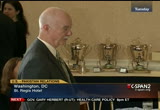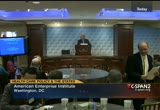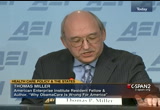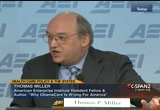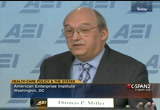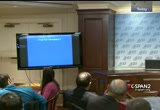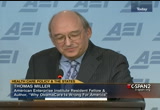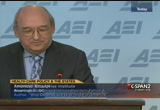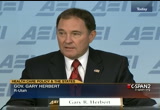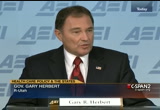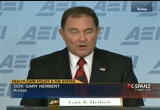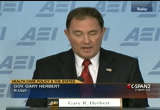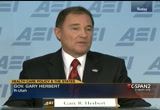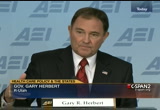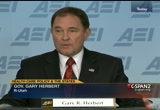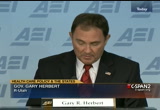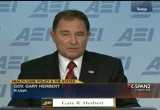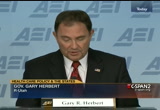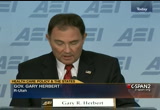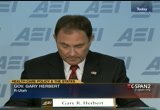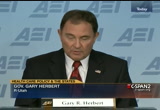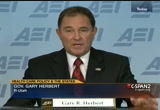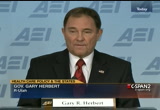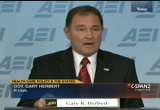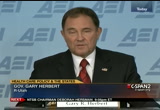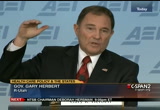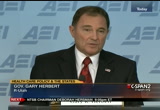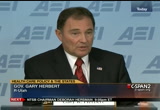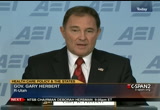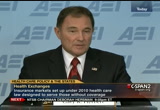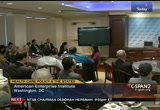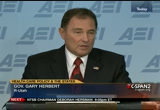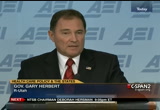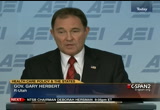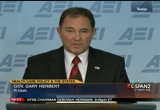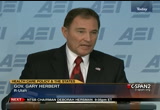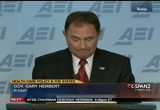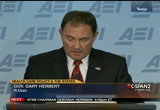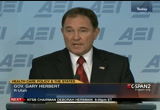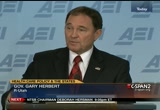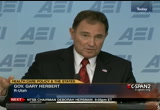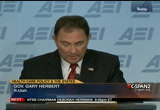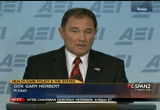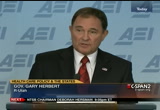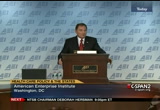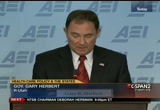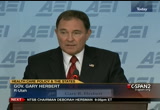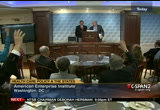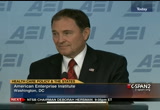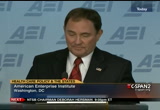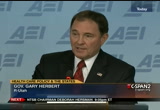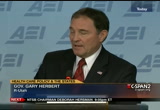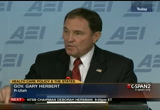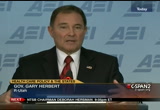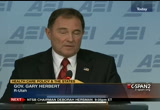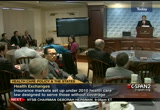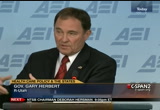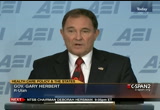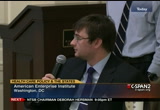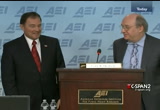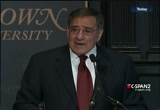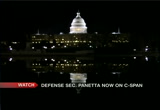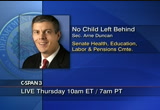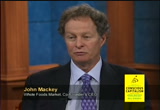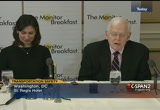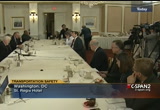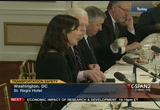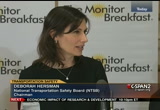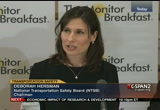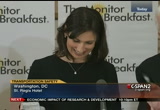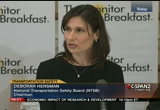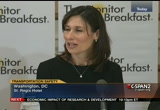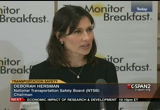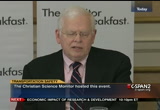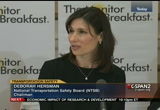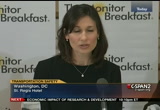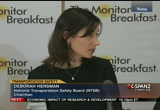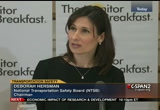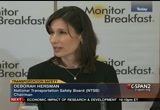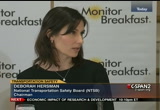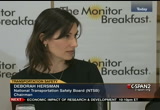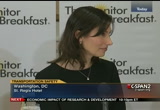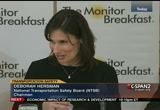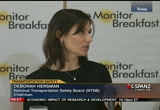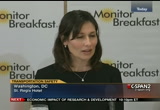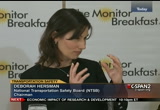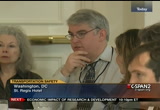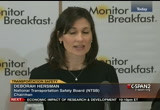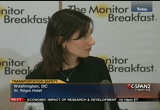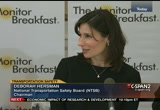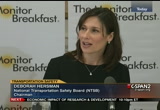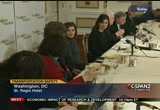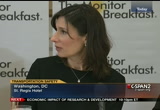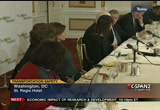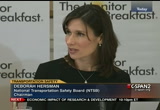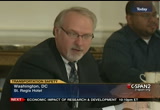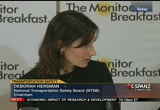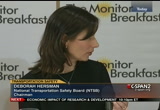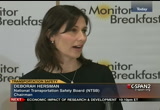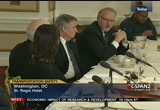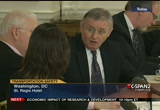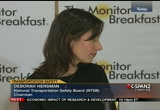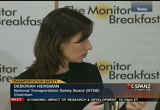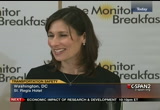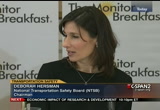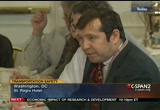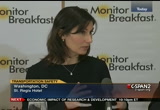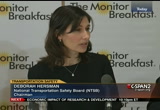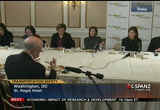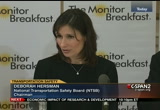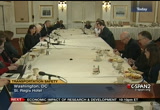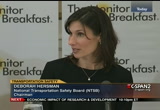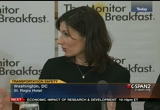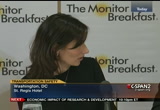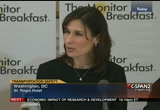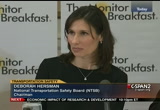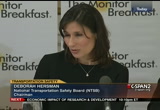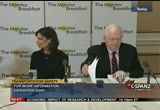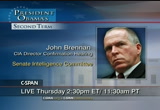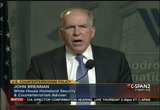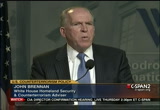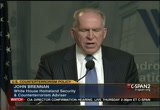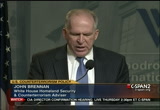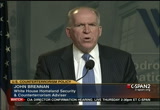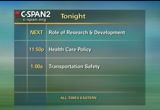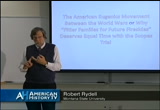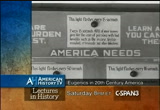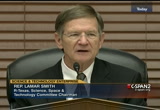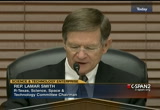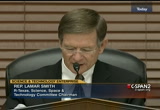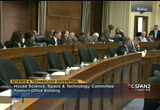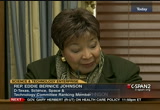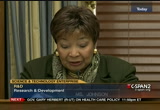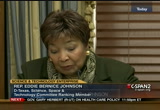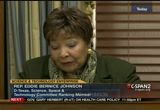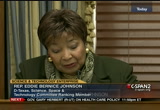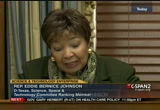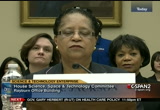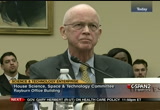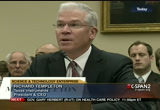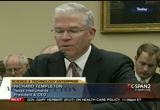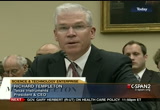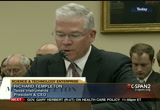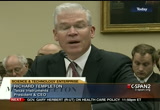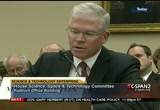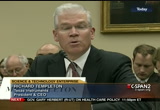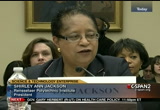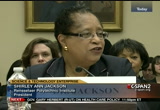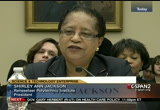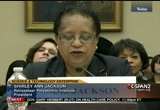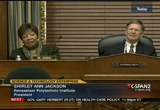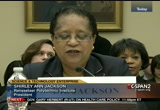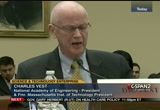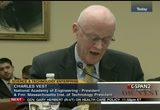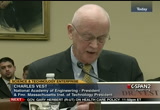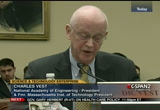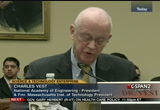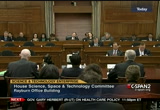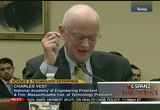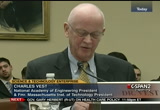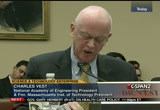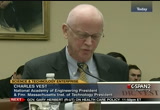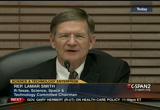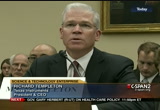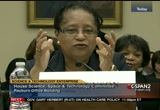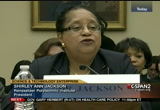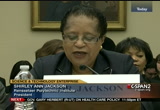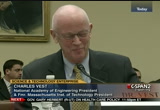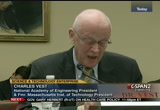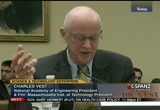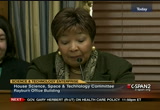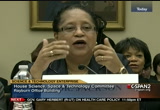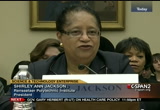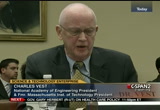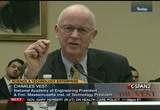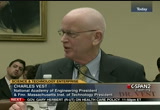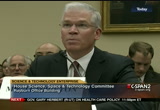tv Tonight From Washington CSPAN February 6, 2013 8:00pm-11:00pm EST
8:00 pm
>> there is no prescription or role model or cookbook for being first lady and if you look at the lives of martha washington or abigail adams or dolley madison or edith wilson or eleanor roosevelt or beth truman or mamie eisenhower, you can see that each woman has defined the role in a way that is true to
8:01 pm
herself, how she can help her husband,, take care for family, maker contribution to our nation utah's republican governor gary herbert says his health insurance exchange will not and force the mandate as the new health care law but focus on small business. he told an audience at the enterprise institute that after meeting with health secretary kathleen sebelius he felt optimistic that his state's plans will improve. his comments on how states can deal with the affordable care act are an hour.
8:02 pm
>> good afternoon everyone. welcome to the american enterprise institute. i am tom miller. today's forum barcott baster from an age of obamacare or as i referred to the state-based policy reform under the affordable care act and health exchanges will it be a choice or natco? we have governor gary herbert to speak today about his experience in the state of utah. as some of you know utah pioneered its own health exchange. we are doing different names for these things these days and even before the affordable care act was passed or was really being drafted as a pilot version. they continued on with that with some success but there is benefit of a back-and-forth towing the state of utah and the department of health and human services and the obama administration as to what does
8:03 pm
and does not comply with addict tapes of the affordable care act. it's not the only state in that quandary but utah having something on the ground in the field. shortly he will be talking about the utah exchange and place it in the larger context of what should represent an innovative state-led health policy reform and also talk a little bit about utah's approach to medicaid reform and a difficult process of getting the federal government to provide flexibility for the states in the state of utah's overall leadership role in promoting patient-centered health care. as some of you may recall last month and it's not a widely recorded story the obama administration asked the decided once again to change the product and change the name. so they decided in mid-january that they didn't want to call it health exchanges but they would now have what we call health marketplaces, marketplaces without our kit perhaps.
8:04 pm
the official explanation for this was that it was because the word exchange could not he translated into the spanish language and for the billions -- millions under the exchange they want to know what it meant, and health exchange or a health marketplace. i want to be helpful in this regard so we can at least try to provide sufficient terms for the beginning of the obamacare dictionary. it was mixture and exchange and of course now it's called an insurance marketplace. there are some other terms in law. a new suggestion translated into the spanish and i won't include my bad accent but that's a new term for it under the affordable care act, donation. another term in the law, mandate. that has been translated new and improved for hispanic and the fisheries, suggestion.
8:05 pm
we have a couple of other terms in the law. it sounds a little exotic but something you can understand in spanish. the young pay more. the partnership. we hear a lot about partnerships. spanish translation, you take the blame. for the states. medicare savings or confiscated budgetary arithmetic here. the spanish term for that, double counting. i looked for some other terms in the affordable care act which the administration hasn't gotten around to retranslate in. premium reductions. spanish, the skies the limit in terms of increasing those limits there are some terms we can find a translation not only in the affordable care act in a spanish dictionary but couldn't even find it in a plain english dictionary. market prices nowhere to be found within the law.
8:06 pm
this is another hard one, composer he choice. it doesn't quite show up in most common dictionaries. there is another question though which is what are the chances of successful implementation? that translate as, when pigs fly so in health policy deciding how implementation of the affordable care act was going to occur whether states will have a clear partnership role or as a surrogate role in what exchanges in medicaid reform look like and with a fork in the road you always have to make sure that you take one of them. so that is where we are at the moment. let me speak to governor herbert who is -- about all of this. sheshe is the 19 -- the 17th governor of utah and has been in
8:07 pm
office since 2009 just reelected last fall currently serves as chair of the western governors association. he is on the executive committee of the national governors association on the work was committee and the nga and before becoming the state's chief executive governor gary herbert served as lieutenant governor for five years. he has been in washington this week having wonderful conversations with federal officials and the administration regarding the future of his state's health exchange marketplace of depending on what you want to call it, but in his view i think the utah exchange isn't half-empty. it's half-full and we will see from early readings what that mind mean for the future. today's presentation brought to you by the letter h, governor gary herbert. [applause]
8:08 pm
>> thank you tom. i appreciate that warm introduction in introductory spanish which i thought was good for us all. i am honored to be here with american enterprise institute and for me it's like coming to the mac and the promised land and certainly we recognize the great contributions that the american enterprise is given over many years in helping us with the development of policy and understanding of what's taking place particularly here in washington d. c., so thanks for the invitation to come here and speak. we are going to talk about health care today and from a utah perspective, my view of the world when it comes to health care. it's a complicated topic and it's certainly an important topic and i know health care has been on the lips of many, the watercooler topic that it may be. i have heard the story of the four country surgeons in utah talking about health care issue
8:09 pm
and they got into the conversation of who is the easiest person to operate on? and the one doctor says i can tell you the easiest people to operate on a really mathematicians. when asked why mathematicians come to when you open them up and take them apart all of their parts are numbered so it's very easy to reassemble. an easier category are librarians. why library is? if we take them apart there alphabetized with only 26 letters, much simpler design and easy-to-use reassemble. the third doctor said 12 i know a better category to operate on and those are mechanics. why mechanics? well they understand if you don't get finished quite on time, and if there is some excess parts that doesn't cause too much concern either. the last doctor says i can tell
8:10 pm
you by far the easiest people to operate on our politicians. when asked, why politicians? you open them up and find out they have no hard and have no spine and have no guts. and ahead in the rear and are interchangeable. [laughter] i think that probably defines some of the challenges we face as we develop policies and wonder if our politicians really do understand what's taking place out there in the marketplace. let me just just talk about health care if i could in utah and why we have done it and why we think it's going to at least be an approach that we would like to have other people take a look at. let me start by telling the story of the small business in my hometown of american utah owned by a fellow by the name of rod martin. it's called world-class auto and there are 10 employees. as has happened to many people since the passage of the
8:11 pm
affordable care act premiums have gone up and he is a business person and was unable now to continue to pay for that benefit package to his employees and so the concern was what to do. he came across the utah health exchange and found he was able to define how much you would pay as a business person because it has a defined contribution as opposed to defined benefit. he also found he was able to then have his employees, the 10 employees, go out there and shop through the portal to find an individualized, customized plan unique we suited for them not a one-size-fits-all but one that they can shop and 10 different kinds of programs for his employees. in doing so he introduced this process introduce competition so they could have people buy for their dollars and the consumers controlling the spending.
8:12 pm
the good news is he was able to provide affordable options for his employees and for himself as a business leader and provide them with the benefit package to include health care reform. it was clearly a win-win approach. that is the example of what we provided in utah and the utah health care exchange. again, chi think health care has been -- it's complicated, it's confusing and i am not sure we have defined the debate very well as we set this up in the beginning of president obama's term. i say that meaning that i expect as we talk about what health care reform means to each of us here hear, we might find different answers. some would think that health care reform has to do with access. some would think health care ought to be focused on quality. better quality. some would say health health cao be focused on the cost for the
8:13 pm
rising costs. what can we do to contain costs? what i would like to concentrate on is what is happening in the state and particularly some of the cost issues that we face here as a country. there is no question that the health care has been rising in many different ways and the cost probably are being put upon us for a variety of reasons. we got involved because like many around the country, the rising cost of health care was making it tough for businesses and for government to pay the benefit cost. the rising cost of premiums. we found out by surveying the people of utah that 70% of those who did not have insurance blamed on the rising cost of premiums. they couldn't afford them and so since we wanted to find out what could we do to in fact corral or contain the cost.
8:14 pm
the question though is what are the principles we are going to follow-up? i'm a believer in free markets. i believe no matter what the issue is, goods or service, that you want to talk about, historically we found if you want to have the most benefit and the best quality of goods and services for the most people at the lowest-cost, that happens in a free market situation. a free market competition. i don't know exactly why it is we think somehow an exception to that rule would be health care. in utah we believe that ought to be part of it. we want to give consumers choice. we want to give them information so they have informed choice and free market competition out there to have the marketplace by innovation and find solutions to the problems that the marketplace defines. that is what we have tried to do with our health care exchange in utah.
8:15 pm
you know i think the concern for many of us, and utah is no different than the rest of the country from the standpoint that there seems to be too many people for a friday of reasons that don't have access to health care, and in our state we have around 12 to 13% that didn't have it. that has ramifications on the marketplace. we all know that if you don't have health care you probably delay treatment, of preventive issues issues and the cost is more expensive. too many people go to the emergency room and as their initial introduction to some kind of health care. and that is usually care which the cost gets passed on to the rest of us here and we pay it in either higher health care costs at the hospital or doctor's office or premiums.
8:16 pm
let me just say parenthetically here too that i think the affordable care act does not address the rising costs. i think all it does is address paying rising cost and i think it has been short-sighted in addressing this, thinking that somehow it's going to solve some of our health care problems because we find somebody else to pay for this. we have to focus a think and that's a discussion for another day, what we can actually do to reduce the cost for the provider, to lower the cost for the doctor in the surgery in a hospital and those things. our premiums are rising in utah at a dramatic rate, and their premiums were going seven times what they had in effect doubled over the last eight years, our premiums before we started into this health care reform. so we wanted to in fact put the consumer back in charge. it was interesting for me to
8:17 pm
find out that in 1960, consumers spent about 70% of their own money on health care so they had some supplement, they had help up 30% whether through insurance or there means the 70% of the cost was borne by the consumer themselves. today they have slipped. now 70% is covered by somebody else and clearly human nature is when people are not spending their own money they are less conscientious of how they spend it. they are not as discriminating and they don't shop. if you are paying for it if you go to the grocery store and you want steak more filet mignon and less hamburger. that's a contributing part of the escalating costs of health care. our system has this disconnect between health care providers consumers and insurers. because of that rising costs more and more businesses than --
8:18 pm
spirals downward -- are dropping as a benefit health care coverage and fewer are covered in more are not covered and in utah we currently have only 45% of our businesses that are providing health care is a benefit to their employees. so, again what to do and how to do it? the philosophy we have again goes back to free market principles. we believe in the invisible hand of the marketplace finding solutions rather than the heavy hand of government commanding control and telling you what to do and how to do it. we want to have a process that is consumer-driven that provides greater choice, better access and have the consumer in charge of the dollars and that will ultimately improve the health care of people. i think sometimes the debate forgets really about people and their health care.
8:19 pm
and their outcomes. in utah has done a pretty good job up until now and providing a good quality healthier lifestyle. we have longevity and we have always been rated as one of the healthy states healthiest states in america. we have currently in place the lowest-cost health care in america and we have rated the sixth-highest quality of life. for a lot of this in us in utah at something that's not really broken and yet we are going to be forced to fix a problem that is minimal and utah compared to other parts of the country. we think that is again a wrongheaded thing. each state ought to be accounted for in our approach on health care reform. we put together what we think are clearly defined principles and goals of what we are trying to do. i would like to add the less
8:20 pm
well along with their free market principles containing consumer choice and information. there ought to be a compassionate part of this. and ensure that there is a safety net for those who really need some help. again i think is george w. bush said i'm a compassionate conservative. what i don't always believe in and that compassion there has to be a government program to -- the compassion. charitable care, civic organizations, good neighbor to neighbor. we have the highest percentage of volunteerism in utah that we have in america. again opportunities to help provide safety net issues. and i think government has a role in that but it out to be one that's limited. but we have to exhibit compassion and understanding and again understand we are dealing with people and they want to have appropriate outcomes for them. when we formed the health care
8:21 pm
exchange, we had some key components of the thought will contribute to the excess. as was mentioned we have a defined contribution. most have defined benefits. we by law have put in place the ability to have a defined contribution that can fix the amount of money that you are going to give and you know now with certainty what the future will bring us larger cost if you're an employer so defined contributions. we have also removed via legislation the insurance coverage mandates. we have said that insurance companies are free to provide whatever options they want out there and the consumers are free to to choose. we are not mandating that you have to cover the situation of this clinical problem with this disease. that is something we want the marketplace to embrace and have the freedom to provide whatever product they want which is
8:22 pm
certainly allowing for more choice for the consumer. we also wanted to have a portal where people could go where we could find information and so we have created this health care exchange consumer-based health insurance portal that he can go to to get information. in doing this we wanted to introduce competition. again as we go out and shop and compare people will compete and buy for our consumer dollars. again that helps to keep better products on the market at lower costs. that competitive aspect of free markets now is something that ought not to be lost in this overall efforts to provide better health care and have health care reform. last but not least the use of technology. we have the ability to share information with technology that we have today with their computers and the internet, have
8:23 pm
databases where we can share information with doctors and hospitals and they can keep the costs down and make sure that the consumer has good information and thorough information so that they can make the choice. it gives power to the consumer which i think we all appreciate and frankly at the end of the day i trust the consumer to make the decisions that are in the best interest for them. we have too much of a government mentality. we know best. we need to choose for you. you may make the wrong decision and i think that is wrongheaded. so let me conclude this part by saying what i'm talking about with utah here is a way of addressing this reform. it may not be the way. other states have different demographics. we have a young population in utah. we are the youngest in america. i am the oldest guy in utah.
8:24 pm
[laughter] if you compared our demographics with safe florida which has a lot more seniors compound their health care needs would be different than the health care needs of utah and there ought to be some reflection and that and what we provide as options in the marketplace out there. but i do believe that the focus we have had on principles are principles and efforts that can be integrated and copied by other states. it doesn't matter where you are at. i think those principles of free market competition and individual choice and putting the consumer in charge of spending the money are principles embraced in no matter what state you're in. let me just tell you of an example of what this has done now as we put this in place. we have a company called leavitt partners. the ceo of leavitt partners is a fellow by the name of mike
8:25 pm
levin, the former governor of utah and former secretary of hhs peer during the bush years. has a company called leavitt and partners and the ceo rich mckeon a fledgling younger company that has 10 or 15 employees were faced with this rising premium cost with their insurance company. and so they found they had a 22% jump in just virtually one montt was a significant problem for them and for their budget. so they looked into the utah health exchange and found out they had some options there and they went to their employees and said, we don't want to pay this 22% increase. we will pay something less and give you the difference of what we paid in the past year. is much we put into premiums we will give to you plus a cash bonus of the excess.
8:26 pm
then they introduce exchange and what they found out was the consumer in charge then out individualized insurance program that they could pick from, 135 different programs from the portal and approved debt out to be the win-win for the business and a win-win for the consumer in having good health care coverage in keeping costs from escalating where company was forced to drop it. there's probably nobody that knows more about health care in the system that is taking place in america than our former governor mike levin. he was raised in insurance family. his father was a successful businessman in insurance and is experienced not only as governor but secretary of hhs gives him a perspective and his embracement of our exchange tells us that we are on the right track here when it comes to health care coverage
8:27 pm
we are in our infancy and the utah health care exchange is not as robust as i think it's capable of being. part of that is because of the uncertainty in the marketplace and we know people are a little bit hesitant to take action. the uncertainty that comes into areas, but what's happening in washington d.c. which is certainly on the fiscal side of the issues and causes as concern is concern about how that will impact the marketplace but the uncertainty of the affordable care act. we have been dealing with this for two and a half years, asking questions, and not getting defined answers, of finding the answers can be given to us because they don't know what the answers are. they have to analyze the legal aspects of it to see the ones up in the administration and what their thought processes were.
8:28 pm
it creates a lot of confusion circling the marketplace. now with what is taking place, that we have got answers to at least what is taking place. we know the affordable care act is here to stay. we were a state that didn't like the affordable care act and we were one of those for challenged it in court. without the supreme court would come down on our side in violation of the commerce clause and we didn't recognize there was going to be a bait and switch on the arguments of the supreme court but we lost there. we hope the election would turn out differently and again mitt romney being the favorite adopted son of utah was her champion leading to efforts to repeal obamacare and the affordable care act. but we now are at the point where like it or not the affordable care act as the lawful wedded utah is prepared to participate in that effort.
8:29 pm
we believe that our exchange is one that has a role to play in the current situation. by the way the contributions of our employers make in this defined contribution vary from zero. you still have access to the portal and access to programs and that people use their own money to have access. to $2000 a month than the average is about $437 as a contribution that is given to this then again i think it has the potential to grow dramatic way. interestingly enough about a third of the people who joined our exchange now are companies that previously did not provide insurance to their employees so they are finding a way they can afford it and using it as their
8:30 pm
business model and it provides a benefit package that is the proverbial win-win. as i start winding this down we will take some time for questions and a few minutes. i think we have a hard time talking about health care reform without addressing the affordable care act. and i do this advisedly knowing it isn't the law -- is the law of the land. it's something i did not support but i think the process, if we look back and look at how we got to where we are today, the process was flawed and if you have a flawed process you have a harder time getting a good outcome. one that i have been critical out is -- critical about is in this process nobody came out and said to the governors in the states what you think about the affordable care act?
8:31 pm
you will be the most dramatic entity in the country. what are your suggestions in your criticisms? what are your insights? i think that was a big big mistake, and oversight not inviting the governors to the table. i think we could have given them some suggestions to make it better if they would have done that. secondly, can't i think the fact the week dropped 2700 pages on the congress and said we are going to vote on this in three days is just not the right way to process the statute particularly as complicated as those 27 pages sorry. i think the statement will go down in legislative history, probably not for good, was speaker pelosi saying we have to pass this bill to find out what's in it. i think all of us recognize that's just not the process and
8:32 pm
it has now sponsored hundreds of thousands of pages of regulations which is still sods to find out what does this really mean and how will it be applied to the states? we have a boondoggle of problems that will be a challenge for us. i guess at the end of the day for us in utah and probably other states that are struggling with the same is how does our perch to health care reform how will that operate in what we call in ace world today? how will it fit in with the law of the land? our exchange, we now have named it avenue h and it's not for avenue herbert but it's to distinguish between the federal exchange, talking about the changes in the nomenclature here, but the exchanges in many ways have taken on a negative connotation and the ability to facilitate people's choices is a good idea.
8:33 pm
so our exchange is fundamentally different than those envisioned by the aca. one, we focus on business, working through them to provide access to their employees on an individual basis. through the business community. and get people enrolled in private insurance. our exchange interesting enough only has five employees. the total cost for what we do in an annual basis is $600,000 a year, so we are not spending a whole lot of money on this process. we will let the private sector do the work and we have the ability to expand but we have a passive administrative process which means we let the market make the decisions and let the consumer make the decisions. we facilitate opportunities and that's all we do. by contrast, cut the aca exchange is based more on the
8:34 pm
massachusetts model. they focus on large businesses and individuals. they have a mandate they are dealing with and they provide taxpayer subsidy for 98% for all the people who participate in their exchange. they have dozens of employees. the size is massive and they spend tens of millions of dollars to operate them. so the contrast is pretty stark as you can see. they also have an active administrator approach where they pick and say this will be acceptable and this will not. they don't have a free-for-all free market approach. they pick who gets to be an exchange. i do believe effective health care reform cannot deal one-size-fits-all. states -- i mentioned the difference between utah and florida. the unique this is is exhibited
8:35 pm
in each state come beach region so each day got to have it inability to pay for their health care solutions to reflect their own specific needs. again the one-size-fits-all mentality comes out of washington d.c. and is putting us on the wrong road. our proposal we are making and i will tell you this has been a work in progress. some of us out in the marketplace and some of us not and i will amplify here what we are trying to to do with him and exchange under the confines of the affordable care act in the lawful land. we are committed to work within the confines so like it or not it is the law. there are what we call red lines that we will not cross over his estate. it's our exchange and we have a right to run at how we see fit. we are not taking federal money. there are no strings. it's our exchange so we are saying the things that we want to and why we won't enforce the
8:36 pm
individual mandate. even though the supreme court has ruled that constitutional, we still think it's bad policy. for a number of reasons, so we are not going to enforce the individual mandates and now every state should have the option to determine for themselves the mandate makes sense, but the staid utah has decided that's not the right thing and frankly i don't want to be on the receiving end of the phonecalls which i believe will happen when individuals are going going to say hey, i'm getting a call from the irs and they are wanting my tax money. because i haven't signed up for their insurance program. second, we will not administer medicaid through utah's health exchange. they want to maintain a clear separation between an approach in the private sector and providing opportunities for the private sector as a postal
8:37 pm
welfare-based system. not that they are not important aspects but we think there should be a clear separation between those two approaches. we want our exchange to remain focused on the core mission of creating competition and choice in the insurance marketplace. those who are in need again we recognize their people out there who have access and the right and it need an medicaid is maybe one of the answers but we believe that should be done separately and not by our exchange. third, you too administer the premium tax credit through our exchange. there is the number a number of reasons why we decided not to do that. one, we pride ourselves on -- in utah in being fiscally prudent. and i wish washington had that same pride which they certainly don't have. we are one of only seven states
8:38 pm
in america that have a aaa bond rating from the rating agencies on wall street which tells us a lot about utah and tells us a lot about what else is going on in the country and fortunately. given the fiscal uncertainty we see here in washington d.c. comic, jetta created by the growing entitlement mentality combat adding another level of entitlements doesn't seem to me and the people of utah to be a fiscally prudent thing to do when we are already borrowing 40 cents on every dollar we spend and in large part because of this growing entitlement mentality we have in the country. i think this becomes a very risky proposition as we go forward. so i don't know how much it's going to no cost thing. i don't think anybody knows how much this is going to cost us in the end. i do know that the promise given in the original presentation by the president was that it was going to cost us about $900 billion. it's gone from $900 billion to
8:39 pm
$2.7 trillion today. now that has tripled three times and we are just starting. who knows where it's going to go and we look at the social security and to look at medicare and medicaid. history says it will explode and become a lot or costly as we go forward. i shudder to think what the fiscal ramifications of this will be going forward. last again, i'm concerned about the insurance costs are going to skyrocket as part of this. the promise again given to us, the hope was that payments were going to go down and affect the number was $2500 get what we have found his premiums have gone up by $2500. that's a $5000 swing since you no, the concept was proposed and the reality today, come
8:40 pm
estimates are that are costs of premiums in utah of the affordable care act will go up by 100%. anywhere between 65% to 100% on the high because those that are young and healthy will have to be part of the pool and have a higher burden to take care of the others that will be brought into the overall program in the country so that price shock is a kearns turn for all of us and i think unfortunately it will be a problem. so in that effort to manage those risks and to live by the law, i have 10 things to manage that. and it least to see if we can't give another option out there for the people of utah that exists currently being proposed. to that end i sent the letter to president obama and asked them to take a look at our exchange and to certify its compliance
8:41 pm
under the aca and then i sent a letter to secretary sebelius basically outlining the same thing, saying we had a good-faith good faith effort and started way before this ever came out -- to this discussion topic you're and 10 and we would like to be able to continue to maintain our state exchange. yesterday i had the opportunity to meet with secretary sebelius and let her know that utah's exchange is going to continue and we are going to do what we think we have to be doing in health care reform is a business-oriented exchange and i suggested to her that we bifurcate the responsibilities under the affordable care act. so utah will continue to operate as a small-business exchange and obtain oversight of the insurance market within utah. two, we will also retain control of their medicaid eligibility system and make the final determinations as far as who is eligible for medicaid including
8:42 pm
chip and user testing system to do that. we would respectfully say to the is department of health and human services that they assume the responsibility for the individual exchange and that includes the web site portal for individuals. that would include the navigator program and that would include administering the tax credits. further, we would say that because utah is doing the business portion of the business , that there is no need to have a federal exchange doing the business. so we have a clear line of demarcation and we will do business. the federal government will do the individual side of this and see if we cannot in fact coexist peacefully here and provide that to the marketplace. clearly there are details yet to be worked out and in putting this together and make sure that
8:43 pm
we are doing this in an appropriate way, but i was gratified and encouraged when i met with secretary sebelius yesterday that they seem to be willing to entertain the idea and the concept and to look at it and see if there is not something that we can agree upon and doing this. the phrase she used was, i would like to find a way. so i'd aimcop which -- cautiously optimistic and we still have a ways to go and we are waiting meeting with them in the next couple of weeks to see if we can bring -- to this issue. last but not least let me just say this. i would expect that that all governors and haul states can say this with me. one, i'm committed to health care reform. i think it's something that needs to be addressed. it ought not to be a republican versus democrat. we have to all appreciate that we need to do and can do things better in the health care arena
8:44 pm
to in fact improve health care outcomes for our people. now i'm a free market guy. i met milton friedman category economist and belief in the free market system. we are doing in utah on an annual basis a health care summit where we will bring all the stakeholders together, doctors, nurses and practitioners as well as insurance companies, the lawyers and business people from all stripes and say what can we do to improve health care outcomes in utah and reduce costs? again that discussion is healthy in the exercise we are going through to help direct the affect costs. we are looking to expand our exchange to provide opportunities for all of our state employees to be a part of the health care exchange of 22,000 people and their families. we would like to expand exchange not only small businesses which we have right now which is up to 50 but to go to 100 then larger.
8:45 pm
ultimately the defined contribution model ought to be available to all employees and all employers. regardless of their size. there is an issue that we are going to be tackling and talking about as we go forward. medicaid comes to the top of my mind. medicaid's most governors will tell you is a budget buster ball budget busters out there. it's a challenge would have risley started out as a 9% part of my budget and is now 20% and over the next decade we will be opted 30% of the cost of our budget which means it takes money away from other areas like education infrastructure and other health service needs. medicaid and the need to have flexibility is going to be certainly something we will watch as we go forward. let me finish by ending where i started. we need to address the rising cost of health health health ca.
8:46 pm
i don't think the affordable care act does that. i think we have provided an opportunity with their health care exchange and utah that allows businesses to contain to provide benefits and help with competitive forces and consumer control to in fact have an impact on the rising cost of health care. it may be imperfect but it's a step i think in the right direction. again the fundamental position that i'm taking and we are taking in utah is the free market works if we will allow it. it takes politicians like himself and others out there to be disciplined and to give time for the marketplace to work. we sometimes are so i just a problem that we don't look at making adjustments that are necessary to get the right outcome. and as i said, if we want the best quality product and the best benefit we can possibly have for the most people at the lowest-cost, that happens in a free market.
8:47 pm
and it happens from the beginning of this country's history and it's happened for all goods and services we have had in health care should be no exception. with that let me say i thank you for allowing me to come and, and pontificate a bit and thanks for the invitation tom to come here and tell about the utah health care change. i think people can learn from what we are doing in utah. thank you. [applause] >> thank you governor herbert. we have 15 minutes for questions and answers. do we have any microphones floating through the crowd? please identify yourself and wait -- though the op-eds can wait until tomorrow we will just take questions today. let's go down in front. state governor thank you for taking my question. john with cns news.com.
8:48 pm
the catholic bishops have declared that the obamacare mandate on contraception and, sterilization and abortion interesting -- abortion inducing drugs drugs is unjust and illegal and a violation of the their religious liberties that they will not obey. do you agree with the bishops the mandate is a violation of religious liberties under the first amendment and if so will you also not comply with it? >> i do agree with the bishops. again i think it's inherent in our country religious liberty and in utah which has its own history of persecution of people trying to deny their religious liberty, it that really is something we are concerned about in utah. people ought not to have to use taxpayers money to put something that is a moral repugnant thing to do so we would support the position of the bishop.
8:49 pm
>> very quickly onto thank you for the leadership you have shown. it takes incredible political courage to do what you're doing and just to step back and bringing it down to the family perspective of what the law means. for the states their greatest number of -- watching everything you do and that's a good thing and also a lot of pressure. a phs has a big incentive to be in conversation with you. your exchange in the future is truly a partnership with the federal government. many people see what you are doing not as a partnership with the governor detecting his people and leaving his state forward and allowing hhs to do what it needs to do. if you could address that and one other quick thing very much related on the issue of medicaid.
8:50 pm
again states that haven't made up their minds on medicaid expansion are watching your every move, no pressure so the questions they are raising with medicaid expansion is the state of utah that is known to be one of the best run states in the country and yet you have turned down federal -- and legislators are hearing over and over again that it's fiscally responsible to turn down federal funding. and yet we are hearing from hhs that we haven't had the definitive decision from utah so it's likely to be more of an issue with you as well. if you could talk a little bit about these issues and how you are protecting utah's needs and exchanges but also how you see the principle of playing out? >> well first let me say there are always people who criticize whatever you do and you can't please everybody and that is why it's important for us to develop
8:51 pm
a set of principles and goals. we have done that from the beginning, principles goals and objectives we are trying to get. health care is an emotional thing and if you look for some help it's easy to say well where's the government to help us? and so i think we need to stay true to principles and it will give us the right outcomes. secondly i think all of us needs to look under the umbrella of the budget. and i mentioned that a function the other day that were talking about costs and why are we not in fact embracing this expansion on this money? i said when i was a young man i had bought my first car and had a couple of different choices out there. my dad said you can he complied if you can afford it. i think that is part of the challenge of medicaid expansion. you can buy if you can afford it. i reject the idea somehow that
8:52 pm
it's free money. you don't comes out of the same pocket when you label it state tax money or federal tax money. they came sabha -- it comes out of the same pocket. there ought to be a growing concern when they're borrowing 40 cents on every dollar that we are driving this country into the verge of bankruptcy. i don't think the sky has fallen from the standpoint can we make adjustments and that its era parable or irreversible but we have to start waking up and saying states have a responsibility. we can't keep going there with the handout. it's hard for us to say if we don't take it that money will be distributed somebody else. we still have to pay it back. my kids and my grandkids are going to be on the hook for that growing expense. so there is always that temptation. we talked earlier. it elections have consequences. we have to put people in place in washington that understand
8:53 pm
that this form of spend more, borrow more has got to stop. we have to come up with some kind of fiscal restraint here in washington. states can help. i have testified before a couple of congressional hearings and said from the utah perspective and i think other states will join with those, we will take less money. don't dangle it in front of us. i want you to say to us we will take 20% less money in utah and take away the strings. unfettered made. i will find integrated way to do things. i will create better opportunities. we don't have to have a diminishment of services just because we have less money. we can do more with less and in utah we have proven it. government is labor-intensive. in utah right now today we have fewer state employees today in 2013 then we had back in 2001. a dozen years ago and yet we have six to 700,000 more people.
8:54 pm
we are very fast growing state. we are providing more services with less people. we are doing more with less. in washington we are doing less with more. it's just the reverse of that. we have a change in mentality in and the states can help lead that way. >> one question about the dash kho. [inaudible] >> jim voc. based on what you are saying howdy feel the federal government is doing getting exchange read the? we have heard a lot of stories that they may not not meet some other deadlines that are upcoming and if you think congress should help push back the deadlines to get ready? >> it's hard for me to look at the apparatus of of the federal government and see how they are doing. i guess i'm a little jaundiced eye decided on the ability to meet their deadlines. that is not unique to anything. it's kind of the way things are run here but i think they have
8:55 pm
been surprised about the lack of embracement in my state and the exchange. most are defaulting to the federal government and i'm not sure that is a good thing by the way overall. for state rights and for those who don't want us to go to a single-payer system. that may encourage that to happen even quicker but the navigating aspect of this, you have to hire hunch is that thousands of people and to set that up and to understand what they're supposed to do and how they are supposed to do it. again when you have got 200,000 pages of regulation that we are still trying to figure out what does it mean, you know it causes a lot of confusion and i think it's going to be forced to delay the actual implementation of all of it and i guess it will remain to be seen. i don't want to be too critical here but this is going to be the most humongous exchange in our
8:56 pm
society since social security under fdr. >> thank you governor. i have a competition free market question for the utah health exchange and other state exchanges. given that somebody is making 35,000-dollar a year and a penalty of $60 a month and they make 200 month and aca projects across 400 a month, is there any effort to lobby hhs to level the playing field because how are you going to compete if somebody pays a penalty of 6200 it's costing 400? i think that would do it if somebody had an interest and what is your opinion on competition for leveling the playing field and the penalty situation? >> people have to qualify to receive a tax subsidy and the tax credit so there are parameters put in place. for some of us we think in the
8:57 pm
premise you can have 400% of poverty. that means people can make over $100,000 a year and qualify for tax subsidies. that does make me pause and say is this really the road we want to go down? is this really where government ought to be when it comes to health care reform? our business side really does not have the subsidy for people it don't qualify for the subsidy and if they want to go to the individual mandate competent than i think there's going to be pressure where people find out hey if i go across the street to the federal exchange, i can get some subsidy and that probably is going to have some impact on the marketplace. business people depending on what they do come kho we are trying to introduce to the private sector insurance and facilitate information and have them choose. whether they ever subsidy or not
8:58 pm
[inaudible] >> well, sure. we could dangle a carrot out there which is the money and we could probably change the incentives. we are reluctant to do that though because we think this in senator graham is the wrong way to go. why do we subsidize and think were not going going to get more but? if you buy you are going to get more because people like what you are buying and we will get more of this. our entire welfare program has grown exponentially because we are in fact subsidizing probably incorrect behavior so i'm very concerned and everything i look at will cost under the umbrella of the budget and i'm a proud american and i'm concerned about the direction the country is going when they are borrowing 40 cents out of every dollar and i see no end in sight. we are $16.4 trillion in debt. it's a number that i don't think
8:59 pm
any of us can even comprehend. >> we have time for one very short question. [inaudible] i think we will go down here and then we will wrap up in a couple of minutes. >> good afternoon governor. a quick question about navigators and assistance. will utah be hiring navigators and assistance and if so, how will you balance that with the professional insurance brokers which i know the brokers are commissioned to work with employers and with individuals to help them navigate the market, and how will utah be doing that if they are? ..
9:00 pm
9:01 pm
>> let me tell you some of the results. we will furlough as many as 800,000 dod civilians around the country for up to 22 days. they could face a 20% cut in their salary. you don't think that's going to impact on our economy? you don't think that is going to impact on jobs? you don't think i'll impact our ability to recover from the
9:02 pm
recession? we are going to cut back an army training to meet and, putting about two thirds of iraq is brigade combat teams outside afghanistan at a reduced readiness level. we've got to cut back on their training. we have to cut back on the ability to support the troops who are not in the war zone. so what happens is we put more stress on those in the warsaw. were going to have to shrink our global naval operations with the reduction as much as one western pacific naval operations, the whole idea of trying to rebalance will be impact. look at the air force flying hours in weapon system is, putting fine units that federal readiness standards by the end of the fiscal year. this is not again. this is the reality.
9:03 pm
these stamps with seriously damage the fragile american economy and they would degrade our ability to respond to crisis precisely at a time of rising instability across the globe, north africa, to the streets of hormuz, from syria to north korea. we have no choice but to implement these measures if congress fails to carry out its basic responsibility to the american people. this is no way to govern the united states of america. >> defense secretary panetta speaks at georgetown is airing on ark of kenyan uppercut by c-span. see it online at c-span.org.
9:05 pm
>> what i discovered a forgotten older and more mature at that is the worst strategy to achieve happiness in life is to make that your primary goal. if you make happiness which are striving for, you will not probably achieve it. instead of the narcissistic, self involved, caring about your own pleasures and satisfactions in life is your paramount goal. what i found this happiness is a byproduct of other things, meeting for work and family and friends and good health and lives in care. would you happiness not directing for a come of it and involving ourselves in fundamentally trying to have integrity and be a good person.
9:06 pm
>> now current head of the national transportation safety board, deborah hersman spoke with reporters for about an hour and a variety of issues including agency's investigation and problems with the boeing 787 and a fictitious candidate to replace reload as transportation secretary. [inaudible conversations] >> okay coming year ago. i am dave cook from the monitor. thanks for coming. our guest is deborah hersman for national transportation safety board or in a recent speech, 400 people you may never know.
9:07 pm
this is her first visit to her heart healthy breakfast club and we thank her for coming. our guess is the daughter of an air force general and she moved around a lot as a child, living in jordan in spain when she was 17, the family settled in northern virginia and any bachelors degree in political science and international studies from virginia tech. after college, guesswork and house member staff while earning a masters in conflict analysis and resolution at george mason university. then she moved to the step of the senate commerce committee. in june 2004 after 12 years, she was appointed by president george w. bush in july 2009 president obama nominated heard the ntsb chairman and a july 2011 was nominated for a second term as chairman. it are usually long for friends at "the wall street journal" are correct, the president caesars at front runner for another job in her second term. so much for biography and
9:08 pm
peculation, not too exciting monitors the process. no live blogging are treating it short. no filing of any kind of the breakfast is underway. there's no embargo when it's overexcited by c-span in our other broadcast guests have agreed not to use video decision for at least one hour after the breakfast and to give those together and they had started filing over bloggers who might watch at home sitting in a proverbial bathrooms. finally commented a traditional thing and send me a subtle nonthreatening signal and i'll happily call on one and all. i will offer shearman hersman the opportunity for opening comments. thanks again for doing this. >> thank you for having me. it's a pleasure to be with all of you this morning. i work for the ntsb and we are really tenacious investigator.
9:09 pm
we investigate accidents and modes of transportation. i need seen a lot about 787 investigation over the last few weeks, but i have to tell you the rest are agency is very busy. we are investigating a bus crash in california. investigators traveling to a crash in paraguay and we have teams working on investigations from pipeline accidents that occurred in west virginia last month to train derailment that occurred in new jersey also in november december timeframe. we are very busy, how a lot of work going on. but i want to chat with you about today is their fatality numbers and read his fatalities. we do see a lot of attention focused in aviation or rail, but
9:10 pm
what we don't see some matches the attention focused on the highway fatalities. we have over 34,000 fatalities every year in the u.s. come involving transportation crashes, 32,000 of those occur on the nation's highways are 95% of all of our transportation fatalities. so what do i see is the biggest risks we face in our nation's highways? first, impaired driving. the ntsb on this issue in our most wanted list of safety improvement. where the top 10 list of things that they can be changed. and impaired driving really had up that list. that is the number one killer of transportation. 10,000 people every year are killed and impaired driving accident. they made recommendations based on a study was completed and released in december and so we
9:11 pm
be happy to talk with you all about technology and i mentioned that later. another issue that's gotten attention is distraction. they are ubiquitous in transportation our life and i see many of them on the table here inside sure many of you will be using some electronic devices later after the embargo. when we talk about distractions in all modes of transportation. i'm pleased to be our investigations in a series that your interest is. >> we paid extra for this good [inaudible] >> i think the last issue, destruction is our most wanted
9:12 pm
list. the last issue today to mention his technology because they think technology really is a cure for many of these areas that we see problems, whether it's impaired driving, we think technology has a role to play there pantheistic ignition interlock and also future technology like alcohol detection monitoring systems that can detect if a driver is legally impaired with a substance. so those are important things for us as we go forward and we think about technology. more importantly when they look at cars and see the changes occurred over our lifetime in vehicles, what we see is huge advances. i was just at the detroit auto show last month and i saw amazing games with respect to technology. collision avoidance to elegy and whether drivers impaired,
9:13 pm
distract it, fatigued, collision avoidance technology will be the future of life-saving devices. vehicles that can prevent, detect, mitigate and minimize accidents, crashes on our highways through using smart technology. so we look at technology is the real solution in many areas. we've certainly seen it best in aviation arena, things that controlled flight into terrain good things that midair collision. we have seen technology be a tremendous resource and eliminating those kinds of accidents. those are just three things that i took that out there on our most wanted list this year. i'd like to focus on highway safety because that's rather fatalities are occurring, but many of you out have different interests on the table and i look forward to answering your question. >> one or two at home over on
9:14 pm
the. friday, kelley, your spokesperson told reuters her investigators move swiftly and are making progress. what progress have you made that you didn't know we could go? >> i have some news to share and that's why no u.k. has come to these breakfasts. ip said that his will announce later today were going to do immediate update and availability of press conference tomorrow morning. we did one about two weeks ago under investigation into 787 and were going to do another one tomorrow at 11:00 a.m. the announcement will go up later today. and that will provide an update on what investigators have been working on, some of the things they've identified and our plans for the use going forward. so i will tell you this is a priority for the ntsb. we have multiple shifts of employees working on this all
9:15 pm
around the world, here in d.c., seattle and japan and arizona, so we are very focused and i look forward to sharing those findings and information with all of you tomorrow. >> i'm sure my colleagues will have some follow-ups, but let me ask you if you don't want to get the nitty-gritty of tomorrow, not ask you about rotter lessons. there is a piece in the seattle times on monday that quoted critics as saying the faa has accelerated the note toward self certification at a time advances technology have created a greater need for independent groups. the question is not what nitty-gritty things are you going to roll out tomorrow, but are you seen or is this confirming any broader lessons about how to do things they
9:16 pm
certified? >> dave, thank you here that's a great question because this is an issue when you have a regulator that has some limited resources. they don't have unlimited resources. they do have to prioritize what they do, so we have seen delegations in the past, not only faa, but other modes of transportation with respect to areas the regulators are responsible for. we see designated engineering representative sir examiners. this is very common in aviation industry for repairs, design changes it does things that happened for years. we also see designated chat pilot. individuals employed by airlines are other folks at the faa does delegate authority to do some of the functions. but always you have to take responsibility for those things.
9:17 pm
you can't delegate the overall responsibility. you have to trust the people you delegate to our doing what they need to do, which have responsibility to verify that and we've seen this particularly pipeline safety or investigate accident, were where responsibilities have been delegated to the company to the risk assessment, to make sure they prioritized correctly and information as they are. in this investigation is receiving are spread then for the regulators, it becomes difficult to have a hands-on day-to-day oversight. you've got to trust the people you delegate to understand what they're doing, have expectations that are well understood, but she's got to verify.
9:18 pm
>> to the sense that may not happen here? >> it's too early to be assessing that. we are examining not just a battery failure, but also the certification process and i will say faa had been caught at it than allowing investigators to certification review they are undertaking on their own. they actually announced that prior to the grounding of the fleet and so we've been working closely with them. for evaluating assessment, whether or not assessment for accurate, whether they were complied with and whether more needs to be done. i think that's important before the airplane is back in the air to understand what the risks are and their mitigated effectively. >> terry corgan or zielinski.
9:19 pm
>> i did want to ask you at the 2010 aviation safety dog with efforts to implement new rules stemming from that. some of the key roles very seriously delayed. the faa has flown deadlines again and again. i wanted to ask you have seriously concerned that poses to you any pc in a good explanation for the delay is. >> well, jerry, many of those regulations the faa is working on came out of the investigator that committees that the ntsb undertook an cold in another accident investigations. we are very ambitious and very aggressive. we set the bar pretty high. we recommend some things easy to achieve, but also things that are hard. i do want to recognize that they have done some hard things.
9:20 pm
for decades we asked women to reevaluate the flight and duty time for pilots. for decades are not able to get that through. secretary lahood, administrator babbitt all works that issue. we got flight and duty time revision for the first time in decades. it is sorely needed and that is a huge lift. i have made progress on activities, but in the area of leadership, training, crew training, areas the pilot records is still marwick needs to be done and in reviewing the d.o.t. ig report on january january 31st that discusses where they are and the status of implementing those rags. they do cite areas where they need to do more. in particular that were not well
9:21 pm
positioned are prepared to implement all of these pieces of improvements. so yes, we think it's hugely important that the voluntary reporting program's are becoming more widespread, that those are being encouraged. more data, better information, knowing what kind of site test failures pilots have to make sure when you have someone in the left feet, they know what their job is and they will perform it flawlessly. that's the passengers expect and so past performance is one of the best indicators of future performance. if you have a pilot to slide multiple tasks, you want to address that and you don't want someone that the leadership leadership skills they need. you've got to really get in there and it's up to the faa come at doi to get into each
9:22 pm
carrier to make sure all the pieces have been implemented. i do think there is a challenge getting to rulemaking. there's a lot of may have trouble. they have had some extensions. that's a concern. >> how important is the pilot training component that ruled the qualifications will? >> at the end of the day, it comes down to good skills, good training, good preparation. pilots day in and day out don't face these situations. the first time they see an event like this will be in the air people who want to escape a situation when the first time this event within a simulator. they got to practice and experience events and learn how to respond, condition that
9:23 pm
response. so those pieces of the puzzle are incredibly important. we see another accident. colgan, air france, you got to make sure people got caught it are prepared when they need to be. frankly did not need to have that emergency action all the time and that's where distractions, all those things that are tough to handle. we've got to focus on those, monitoring skills so you note the airplane is doing camino through slowing down, speed degrading. you know what the airplane is selling and how to get out of it. those skills are hugely important. >> will go next to him to fairfield. [inaudible] >> in recent errands is insight auto fatality has been dropping significantly until about two
9:24 pm
quarters ago, where it really up words. do you have any idea why that is after a sharp drop in the last couple years? >> you know, a lot of people deserve credit for the gains made. the auto industry deserve tremendous credit. they have designed safer vehicles that survive crashes, crash cages, seatbelts or pretension. dual stage airbags, better crash cages broad types of collisions, frontal, side, airbags standard and vehicle, side curtain airbags. we've seen tremendous gains in vehicles, voip also seen on the human side a lot of change. when we corrupt, most of us, maybe not maybe, but when we corrupt, i remember being a child and i doubt remember if he
9:25 pm
seatbelts seatbelts are inaccessible in the backseat of the station wagon. for the most part they were sacked and underneath the sea. >> you wrote about your sister writing. >> that's right. and that goes to the child seat issues. i'm seatbelts, and a generation, since i've had children of im, were in a completely different posture as a country. my kids wanted and that they back out of the driveway without being properly restrained, even if children in their car seats now were seatbelts. so that type of behavior has resulted in change as well. we talk about child passenger safety, nasa child, they didn't have requirement. no other single state and the district of columbia require parents to properly restrained intent and small children. that's amazing. we pass laws in all 50 states
9:26 pm
and the district of columbia. 95% compliance and child passenger safety. i remember as a child i had a sister who is seven years younger had a car seat, but it really was the first defeat because every time i read around a corner onto my sister and me on the other side, so it's just a keeper from crawling around the car. in particular, dave mentions something that affect me that i thought as a parent you never want to go through. in west virginia, my little sister michelle is in the front seat on the armrest in-between my mom and dad, perched up so she could see out the window and there was a dog that ran across the road in baghdad hit the dog. and i remember my sister's night crying and being upset and asking my dad why he didn't hit -- i hit the dog and didn't avoid it.
9:27 pm
my dad was a fighter pilot and he said he was either the dog or michelle. i did not and at the time. now it's an investigator for many years, i do understand it. he understood he slammed the brakes on a little sister who was on the armrest would've gone into the windshield. now, no parent has to make that choice when they're driving, whether it's their child's safety or something else on the roadway. their children are properly restrained and they can take the right action. those are the changes that resulted in a positive in the down trend those fatalities. i think there's a lot of things that factor into the statistics. i'm not sure people understand how much to attribute to each thing, vehicle design, human decision-making. the uptick now, whether that's related to the economy, more people driving, more miles or
9:28 pm
other things that construction. i don't think people know why those numbers are changing. but it's important to figure it out and we've made recommendations to gather better data. on the area destruction, we won all states to identify whether or not somebody who's either using a sound or texting are talking. it's difficult because some adenosine no accident they can't tell you what they were doing and if they survive, they won't admit to the behavior if maybe there is a law. now we have the laws in different states that being texting. they might not admit it. >> this goes to your earlier point out anti-coalition of bases. [inaudible] >> the faa requires transponder devices, but they don't require
9:29 pm
it for quakers. back in 2008, the sub one did recommend the faa change this and include gliders among the greatest aircraft. as far as i can tell, the recommendation was never taken out. can you give them a sense of happened there, what the status is and if there's any follow-up? >> sure. the answer is about transponders and writers. the respondents -- the sub uninvestigated accidents in which gliders were involved in a match at aircraft that collided with the glider in midair. the pilot to come down safely in the business jet was able to land safely. out of that investigation we realize we have great technology. but only 50% of the equation will not get the benefit of it
9:30 pm
in on a check, you'll be coming up quickly on something you could collide with camilla kicklighter comest you want everyone to have awareness of that. again, we make recommendations. so they are unsure and pepsi people to decide. many requirements to passes regulatory processes require them to do a cost benefit analysis and determine if the gains will outweigh costs. there are challenges, but the sub one dishonesty that cost benefit. we recommend equipping all aircraft with transponders would make them safer. >> if you know, is the faa still undergoing the cost benefit analysis?
9:31 pm
>> you have to ask the faa would be seen on implementing that. >> i want to do a segue here and that is he recommended to implement what they would welcome the chance to have a job where you could order rather than gradual? >> i have to say that the sub one, we are able to issue recommendations and that is a very important part of the transportation safety equation because when congress created as, they said we want to be the conscience of the transportation industry. we want you to be the compass. sometimes recommendations are ahead of their time and i know people like joe know we've got recommendations that are decades old. things that positive train control as i most wanted list now.
9:32 pm
recommendations go back to the 1970s, but at some point there might be enough interest, enough coalescing that other people decide to embrace recommendations. it is important to have somebody who sets the bar high. i saw people relate the rabbit or a greyhound that people are chasing them it's important to have the rabbit. it's important to other people say how can we do this? is it feasible? when do we do it? how to implement it? while part of a system and in the united states, the system works incredibly well. we've had years without commercial aviation fatalities. we've had years of declining highway fatality numbers with more people on the road straight in more miles and fatality numbers have gone down.
9:33 pm
we have huge successes, for the people who work in the transportation industry like railroad employees are people who are users of the industry. our system is effective, but it needs all the different parts to be that way. >> with 57,000 employees in a budget of 77 land, does that appeal? >> i feel very privileged to have the job i have now and in fact that's the only job i have right now, so i'll be focused on that. >> can't say i didn't try. >> i wanted to ask you that lithium-ion batteries. the benefit of the 787 investigation because that's still going on, the sub one has done a lot of work on lithium batteries and you have a form on it. but there are increasingly aircraft carriers designed with
9:34 pm
batteries as part of their systems, not just a 787, that the 8350. airline manufacturers talking about retrofitting existing planes to take out older batteries and putting newer light weight batteries. how confident are you that lithium-ion batteries are compatible with aviation, both in the operation of aircraft and escargot? >> john, we've been looking at this issue for a long time. they've investigated cargo aircraft events with her lithium ion battery suspect this forest fire origination. we investigated and then were pallets of batteries, fire on the ground and so we have looked at this issue. i will say in anything with technology is going to the
9:35 pm
advances and changes. there's going to be new design, new material, new equipment. that innovation is going to happen. we want to see that move forward. but the safety side is making sure you've done the right risk assessment that should understand that failure modes are unmitigated any potential risks. that is never more important than aviation. i don't have the opportunity to pull over when there's a fire. they don't always have accessible compartments. they don't have fire suppression and some of those areas. so that is where we've raised concerns in the past. we've clearly had concerns about batteries they get damaged in shipment. concerns about packaging and labeling to know what people
9:36 pm
have, but i would not want to categorically say these batteries are not safe. any new design will be inherent risks. the important thing is to mitigate them. >> so you're not saying lithium batteries or 100% not compatible with aviation escargot for in the design? >> in the past, the sub to have expressed concern about the risk and recommended mitigation numbers. that entails understanding of failure modes when they're transported, how they packaged, how they're labeled and how those protections occur. what we saw in the 787 and battery fire in boston shows us there's some risks are not mitigated, not addressed. we need to understand why that
9:37 pm
happened and make sure future installations but this risks are mitigated. >> next to jeff and then brian tumbled seat and then catherine wolf. >> i can never talk to you -- [inaudible] we saw a bus crash in california they are now turning out the company has documented safety problems before the crash, including the bus that crashed was stopped twice last year by the highway patrol and taken out of service. this seems to underscore an ongoing issue you talk about a lot and put on your most wanted list. could you talk about difficult to for the industry that even
9:38 pm
when there's companies with no safety problems, it seems difficult for the transportation department to act on them? they might just come you covered this by now you know a lot about it. perhaps for your colleagues or nested layer on this issue has been on our most wanted list integument for the question about batteries. i think we'll hit all issues before the lunch is over. i'm bus safety, one of our concerns as there's not new issues when it comes to safety of bus operators combat operations. we see the same thing over and over again. we see fatigued drivers from the vehicle is properly. we see problems in the crashworthiness and design of
9:39 pm
these buses to my site and the catastrophic nature of rollover events. because of a bus accidents this winter season that resulted in fatalities. in the end, we see companies that are not part of service until after they had a fatal accident. so they are inspected. they do have records, but they aren't addressed until after the sale accident. we sat time and time again. i will say california is a great state when it comes to investment and motor carrier safety. they're one of the leaders at every bus company getting investigated. i'm not surprised you're the california highway investigated. i'm not surprised you're the california highway patrol pulled the bus over multiple times. at the end of the day, is that the cost of doing business to get pulled over and put out of
9:40 pm
service? we see millions of inspections on the roadway of commercial vehicles. while commercial vehicles, buses and trucks, this is important. all of us strive on our highways beside you and your family. over 20% of the tracks inspect a roadside to put out of service because it's so significant it has to be repaired before they're on the road again. the site breaks. 7% of the drivers could put out of service because the hours of service a record violations. we would never see hours of service violation in aviation. pilots will not rust or hours, we see it routinely on highways. drivers has to carry loads to places they can't possibly get to within hours of service and people driving longer than they should be tired.
9:41 pm
we see them over and over again. the vehicle got put out of service multiple times in that company wasn't shut down, you know, these are the challenges. we've got to have regulations and penalties have to be a deterrent. >> so this process was put out of service twice and put back on the road, but just three weeks ago the federal frustration did a compliance review in which they're supposed to look at safety records. they don't necessarily look at the buses. do you think that is a problem with the agency mandate that should be changed? >> we made recommendations in 1999 and the sun on our most wanted list for many years that
9:42 pm
if a company had unsatisfactory vehicles were unsatisfactory drivers, they should be put out of service. those are the indicators. past performance, future performance. you're getting a lot of information telling you what could happen. [inaudible] >> -- hurricane sandy, major saltwater damage to subways, trains, new jersey transit, tunnels, signaling equipment, vehicles that had been cleared total by insurance companies, but somehow make it back on the road. our mass transit riders in new york and new jersey at major risk right now of being involved in an accident because the signal failure?
9:43 pm
>> are you talking about braille track signals? >> damage basalt and wonder that are slow to be replaced. congress took three months to approve san diego. seemed like it was no urgency. is this an urgent issue? >> it's very clear that they had significant damage in the relief money was needed to address the infrastructure issues. i know the fta has been working to address those, but this point, the substitute is not an investigation, so i don't have an opposition and i refer you to the inspection being done by the regulator and the operators. >> are you concerned about vehicles make an impact on the method this saltwater damage? >> personal vehicles?
9:44 pm
>> yeah, we've certainly seen in the past some consumer issues with respect to natural disasters and i will be important to deal with. it's not the ntsb's role, but we've are up in new jersey after hurricane sandy this fall. there is a train derailment in paulsboro but 13 right at the end of november, beginning december. unwearied areas for something like that has happened, part of our investigator committees determine how high the water level had been at that rage. there was a derailment on the bridge. were they affected by the surge, so we do look at those issues that we have an investigation. you're just asking things that are investigating activities tend to be react to after an
9:45 pm
accident is happening. we may not get involved in any of the questions are asking about. >> is there any agency talking ahead to the possibility of major accidents because of the saltwater damage? >> are probably look at those issues. i.t. is concerned about damage to the tunnels and working closely with operators out there. >> organa go to brian naylor. >> a quick question and a quick follow-up. i understand you made it clear you're enjoying your job, but i want to ask you if they've been in contact. >> is a lot of speculation and for many of you that's what you do. my job is to kill and the facts
9:46 pm
and that's what we really focus on. the fact is this is my job. i'm the chairman of the ntsb and i'm happy to talk to that in the activities working on. >> in terms of the white house been in contact, which elect to take on that? >> i'm happy to talk to you about any investigative activities and stay focused on the work i'm doing now. >> can you share with us what is the most concerning thing you seem so far in the course of this investigation from iraq right now? >> the question is most concerning thing we've seen so far. about two weeks ago tomorrow, we did issue findings we identify short-circuits and a thermal runaway in the battery where we saw uncontrolled chemical chain reaction in those features are
9:47 pm
not what we would've expected to see in a brand-new battery and a brand-new airplane. they want to make sure the design is robust, that the oversight committee manufacturing process were all adequate. so will be part our continuing investigation to determine the failure modes, what may have caused it caused intima could mitigate against that in the future. [inaudible] >> i wondered if you can say anything more about how you look for a problem when there isn't an obvious culprit or has it been a nokia sculptor in the first few weeks and that you got the battery and the monitoring system and electronics beyond
9:48 pm
that. can you talk about how your investigation traced to find something difficult to find? >> we may not see was a battery in it to look around at the ranch, but we can say it wasn't colonel mustard. we are an agency that is very thorough and some other things than some of of you all are familiar with the investigation says about ruling things out. there's also things we want to rule out. we want to take those things off the table. our investigators are methodical. we are seated with a lot of care in this investigation and what we do come with a great benefit of the party system. we bring in people with expertise in so in this case, faa and boeing are with us. the battery manufacturing is there with us, but also experts from iran's government and around the world.
9:49 pm
folks from the navy surface warfare center at carter rock. we brought up of experts from nasa. guerrilla consulting and that's a great benefit in so many people offering help and services to us that we really are appreciative of that. and the map or level, we look at the windings themselves and components part, that that were taken exemplar batteries and doing tests of those to see where we may not be defined in this battery because of a thermal damage, but could we find the subject it to other things. we are working with boeing and the faa. i will tell you we are going to have information tomorrow, but we are probably weeks away from being able to tell people,
9:50 pm
here's what happened and what needs to change. >> can you see anything about what might be found during additional flight test, how that might be to information or clues? >> the faa has offered those flight test and that really is in their purview. we are not directing any activities with respect to testing, so you need to contact them about what they hope to gain. >> ryan. >> as they were manufactured in japan, do you have concerns about not to cast aspersions on the company manufacture, but the certification is insufficient when it comes to outsourcing of all these different components of a complex system like the tree minor. >> we've looked at contracting
9:51 pm
or outsourcing in many different areas and in particular can go back to an investigation that took place in north carolina. we had an elevator miss rate. we had a complete loss of passenger aircraft. that made his work contracted out. you can contract out work, activities, but you can't contract responsibility. so it doesn't matter where the work is being done. he got the processes that ensure quality and you've got to have the right audit procedures in place. this is the u.s. aircraft certified by the faa. they're other parts of the aircraft built all around the world. it's important to integrate those in a way that assures safety and affected the
9:52 pm
operator, manufacturer to do that. >> yes, ma'am, nbc. >> bottom chairman, can you get us on the current position regarding electronic devices on board aircraft and whether it's time to revisit restrictions. >> for passengers or pilots? >> for both, particularly passengers. >> the ntsb doesn't have a position on electronic devices by passengers. the ntsb does have a recommendation out with respect to wireless device for electronic device by pilots. you all remember the northwest 180 overflight that overthrew their destination by 100 miles. the pilots on their laptops at the time. they didn't realize it overflown until they recommended the cabin for landing and they realize the
9:53 pm
plane had been on autopilot and kept going past their destination. we also found the investigation that the first officers texting while the aircraft was taxiing when they were departing. it does show the prevalence of electronic device is in a very dangerous time of operation operations on our most wanted list of file. got another one in for those of you counting. i don't know if we've gotten at 10 yeah, but the issue is important, so we want pilots to be and we ask the airlines put in their pre-fight checklist, so most of the airlines have policies, but we find in our investigations those policies have been violated.
9:54 pm
>> anybody who hasn't had one? >> i'm just getting up to speed, but it's my understanding there were no guidelines at the time it was designed and built. subsequent to 2008, a guideline was developed. do you think the tree minor needs to meet the current standard at other airlines and airplanes need to me to get back in the air? >> you may be treading on the information i talk about tomorrow. [inaudible] >> will talk about the special conditions put into effect at a time of the tree minor is certified. what happens when an aircraft certified against locked in to standards in existence at the time. the question as time goes on to the life of that aircraft today comply with the standard, so
9:55 pm
that's always the question concern for us another investigation. known icy conditions, other technologies, i was only for good infectious aircraft are issues that we do look out regularly in our investigations involving some thing will be focusing on what batteries. >> yes, sir. >> you mentioned the ntsb beyond the 787, with any future opportunities that arise be effect did -- [inaudible] >> i think what you're asking us all the activities the board has the board has an incredible
9:56 pm
design. we have the most amazing to go staff. they are the ones that go out to the accident sites. they do the investigations. they work in the lab. they are the back bone of the ntsb. they are what makes the ntsb who we are. it's their work year in and year out from one port to another, one chairman to another that produces a quality product. board members serve for terms of the wave designed as a board member's term is up every year and it's part of the process of the way the ntsb was created that envisions a turnover and continues to do good work. proud of the reports are teams that work done in the eight and half years i've been on the board and leasing investigators retire from retired to investigators and they always impressed me. i know this agency would
9:57 pm
continue good work for many years to come. >> i'll ask you a question about something that you might want to add that joseph your budget. your budget is not exempt from the sequestration i was wondering if you make contingency plans in with this plan site. if i could ask you to expand on that sensor found in the recommendations to the d.o.t., what areas of the d.o.t. returnable? >> wow, mike, does a lot of questions. yes, the ntsb subject to sequestration like every other government agency. yes were making plans for how we deal with that. my number one priority is to protect her people, but we are
9:58 pm
making plans and trimming things that we can trim in anticipation of that. that means putting something software we do a big investigation that the 787 does consume a lot of resources for us. >> can you elaborate on what specifically you would put off? >> being sick equipment purchases, renewals of leases, you know, the things we can change. there sent things we can't change, requiring this may have, but renegotiating things that parking contracts in the building. we are doing all of those at the night as if poor to have cuts. small things, large things, reconsidering those as we move forward. contingency plans. with respect to d.o.t., i'm going to stay in my lane and talk about what the ntsb might be facing. there'll be her decisions if we
9:59 pm
end up in the sequestration situation. none of us are prepared in these difficult budget times. i'm in an agency where we have at increases in several years. a cut of almost 10% in an agency that's almost all people don't have any grant programs. that's a hard hat for us. >> on that note, we thank you for doing that. especially given what a timely time it is in different ways. so please come back whatever form you choose to. thanks very much. >> thank you, dave. [inaudible conversations] ..
10:00 pm
live coverage on c-span at 2:30 p.m. eastern. members senate committee are expected to ask about drone strikes and terror suspects. at the wilson center, he said drone strikes are legal, ethical, and live. >> i stand here as someone who has been involved with our nation's security for more than thirty years. i have a profound appreciation for the triewlly remarkable capability of our counterterrorism probablies. and in our relationship with
10:01 pm
other nations, and we must never comprise them. i will not discuss the sense of detail of any specific operation today. i will not nor will i i did voling sensitive intelligence sources and methods. for when that happens our national security is in danger and lives can be lost. at the same time, we reject the notion that any discussion of these matters is a step on to a slippery slope that inevitably endangers our national security. too often that fear can become an excuse for saying nothing at all. which creates a void that is then filled with myths. that in turn can erode our vebility with the american people and foreign partners. and it can undermine the publics' understanding for our efforts. in contrast, president obama believes that done carefully, deliberately, and responsibly we can be more transparent and ensure our nation's security.
10:02 pm
so let me say it as simply as i can, yes, in full in accordance with the law and in order to prevent terrorist attacks on the united states and save american lives, the united states government conducts targeted strikes against specific al qaeda terrorists. sometimes using remotely piloted aircraft, often referred to publicly as drones. and i'm here today because president obama has instructed us to be more open with the american people about the efforts. broadly speaking, the debate over strikes targeted at individual members of al qaeda has centered on their legality, their ethics, the wisdom of using them, and the standards by which they are approved. with the row minored of my time today, i would like that address each 6 these in turn. first, these targeted strikes are legal. attorney general holder, jay
10:03 pm
johnson have addressed this question. to briefly recap as -- to protect the nation from any imminent threat of a i tack. the authorizationization for the use of military force, the aumf has pass i be congress after the 9/11 attacks, authorized the president to use all necessary and appropriate forces against those nations, organizations and individuals responsible for 9/11. there is nothing in the aumf that restricts use of military force against al qaeda to afghanistan. as a matter of international law, the united states is in an armed conflict with al qaeda, the taliban and associated forces in response to the 9/11 attacks. and we may also use force consistent with our inherit right of national self-defense. there is nothing in
10:04 pm
international law that bans the use of remotely piloted aircraft for the purpose or that prohibits us from usinglet l force against our enemies outside of an active battle field. at least when the country involved can sense or is unable or unwilling to take action against the threat. second, targeted strikes are ethical. without question, the ability to target a specific individual from hundreds or thousands of miles away raises profound questions. here i think it is useful to consider such strikes against the basic principles of the law of war that governor the use of force. targeted strikes conform to the principle of necessity. the requirement that the target have definite military value. in this armed conflict, individuals who are part of al qaeda or associated forces are legislated mate, military targets. we have the authority to target
10:05 pm
them with lethal force, just as we target enemy leaders in past conflicts. such as germans and japanese commanders during world world war ii. targeted strikes conform to the principle of distinction. the idea that only military objectives may be internationally targeted and civilians are protected from being targeted. with the unprecedented ability of remotely piloted aircraft to precisely target a military objective while minimizing collateral damage one can argue never before there's been a weapon to allow us to distinguish more effectively between al qaeda terrorist and in a sense civilians. targeted strikes conform to the principle of proportionality. the notion that the anticipation of collateral damage cannot be excessive in relation to the military advantage. by targeting an individual terrorist or small number of
10:06 pm
terrorists that can be adapted to aharming others in the immediate vicinity. it's hard to imagine a tool to better minimize the risk to civilians than remotely piloted aircraft. for the same reason targeted strikes confirm to the principle of humanitarian which requires us to weapons that will not inflict unnecessary suffering. for all of these reasons, i suggest to you that these targeted strikes against al qaeda terrorists are indeed ethical and just. >> in a few moments the house science committee hearing on the economic effect of research and development.
10:07 pm
on the next washington journal an inside look at the meeting and the immigration debate the center for community change. from arizona senator john flake talking about the defenses between the bipartisan senate and the white house immigration proposals. and later the government's treatment of soldiersiers with.t from mental health at the office of the army surgeon general. washington journal taking your calls, e-mails and tweets every morning starting at 7:00 eastern on c-span. >> if go to most american textbooks i would make you a bet you had in high school. my bet with you is that in your american history textbook in high school. you go to the index, you will find no mention of you
10:08 pm
eugenics. if you go to the biology books in high school, you would find no mention of the word you againics i just looked at biology assigned by most of the courses here for introbiocourses at montana state university. great textbooks i department see any mention of eugenics it's because we no longer believe in eugenics we don't have to think about it. as if we historians because we know that it was -- question pretended that wasn't part of american culture. glmpleght now a science committee hearing committee about research and development leads to innovation that grows the economy. witnesses at this hour and forty
10:09 pm
minute hearing include the head of texas instruments. [inaudible] [inaudible conversations] the science technology committee will come to order. ly recognize myself in the opening statement and the ranking member for her opening statement. the topic of today's hearing, the first of this committee in this congress is america competitiveness, the role of research and development. this is ab appropriate hearing because much of the jurisdiction of this committee relates to keeping america globally competitive. america's ability to compete depends on whether we have the present vision to conduct the science that will dwient future. as a wall behind me says there's
10:10 pm
no vision the people parish. this committee's goal and today's hearing is to help define that vision and ensure that america continues to be a leader of global innovation. our first hearing today will begin as processed by examining the positive of impact of today's r&d and looking forward to potential breakthrough innovations in the future. americans have always been innovators and explorers. our ancestors crassed oceans and opened frontiers and ventured to explore a new continent and travel to the moon. for the lewis and clark expetition to the international space station, from the telegraph to broadband internet, americans have lead the exploration of the unknown in developed invention of the future. in our short history, we have produced world say mouse scientists like ben franklin, thomas edson. but countless more american
10:11 pm
scientists who are not world famous, nonetheless have been changing the world. have you heard, william burrows, john bar dean, or ruth? according to national invetters hall of fame they created the electronic calculator. they worked with nobel prize winning team to help crete silicon valley and silicon hills. we can think a chemist for developing cotton that many americans wear. as america as innovators as it used to be? some wonder if america's greatest technological achievement are behind us and if other nations like china and india will surpass us or perhaps already have. some nations are creating environments so attractive to global manufacturers that companies have relocated much of their activities on foreign
10:12 pm
soil. our global trade imbalance is do growing as we export less and import more. and today the imbalance includes many high-tech products. other nations are changing their policy to become more competitive and so should we. fortunately blazing trails in to new frontiers is what america has always done best. to set the stage for the congress and to understand where america is heading, we have very knowledgeable witnesses testifying before us today. each of them understands both the public and private research and development efforts as well as where our global competitors are headed. members of the committee have the opportunity to work together on policies that will help america stay competitive. and today's hearing is the first step. that concludes my opening statement. and gentlewoman from texas is recognized. >> thank you very much.
10:13 pm
for holding the hearing and thank you for yesterday's bipartisan retreat. i hope all of us will listen attendively. i know, we will hear from about the critical importance of federal research and investments and i look forward to their testimony. as a competition for scarce resources is intensifying, there's been some who would describe the research community ooze just -- as just another special interest leadership group to share the the pie. i could not disagree more. they should have -- self-interest and i hope they do. when weather they are representing universities or high-tech companies. but the to label them as nothing
10:14 pm
more than another intecialg interest group is a at best misleading. without dismissing the value many of the investments we make with our limited discretionary budget, and there's probably no single investment we make other than education that has done more to ensure our nation's long-term economic vitality than the investment in r&d. this hold true for very long time in business. the government is uniquely suited to make an exploratory research. we have no idea, if any, applications -- it holds true that the financial and intellectual partnerships we build with the private sector to address more midterm r&d challenges. all of the investments here measure the yield and
10:15 pm
immeasurable benefits to icony and society in terms of companies built, jobs created and society made a healthier, safer, and more secure. they also have to do the secretary of -- and engineering that will contribute. and all of these ways now on generation and particularly pleased to see a few of them sitting out there. hopefully some of those in the future. some specific examples of ground breaking innovations and companies that would not have been possible without federal r&d investments includes the internet, gps, google, the iphone and god, what would you do about that? i expect we hear more examples from the witnesses and we can probably spend our two hour hearing reading a list. and yet, i feared some of my
10:16 pm
colleagues in congress would still be unimpressed. we will still hear arguments that the federal government's role should be restricted to basic research base the private sector can do the rest alone. that, everybody, has to take a cut. that is the 8.2% cuts looming on march 1st [inaudible] i happen to believe personally that we can invest in unemployment and food stamps, or with can invest -- to e limb the needs. so let me attempt to briefly effort some of the arguments. r&d is not simple. linear process from basked to applied to developmented and so on to a final commercial
10:17 pm
product, it doesn't go in only one distribution. rtd is part of a complex innovation process with -- [inaudible] there's no clear line at which the public role ends and the private role begins. and there's not been any my of our lifetimes. that's why partnerships between the public sector namely our federal agencies and the private sector such as mr. temple ton's company texas instruments instruments is so important. second i would like to say a word about the consequences of sequestration. at the risk of repeating myself, we would not just be turning off the lights on many ground breaking research facilities and experiments today. we would be eating our seed corn for tomorrow. we would know at the end of the tunnel, the lights are out. what talented young person would
10:18 pm
see a future in scientific research after sequestration does the damage? our witnesses were asked in their testimony to speculate on what kind of great technologies we might see in the next five to twenty years. i think if any of us knew the answer to that, we would be rich. that is the point. we don't know what distributions our research might take. what unknown applications and innovations will be developed. and nor did our predecessors invest in what we have today. we cannot afford to overestimate what the private sector is prepared to do on the own. and we cannot afford to underestimate the negative consequences for the nation's r&d enterprise of letting sequestration go forward. with that, mr. chairman, i yield back. >> thank you. let me introdisuse our
10:19 pm
witnesses. the first witness is mr. richard temple ton chairman, president, and ceo of texas instruments. he has served as texas instruments chairman of the board since april of 2008 and president and chief executive officer since may 2004. in addition to the work with texas instruments, he also serves as the chair of the task force on american innovation. the broad group of stakeholders that supports scientific research. he earned the bs in electronic call engineering from union college in new york. our next witness is dr. shirley ann jackson president of the pollty -- prior to her tenure, mr. dr. jackson served as the chair. she also is had a career working in several physics laboratories and researching sub anatomic particles.
10:20 pm
she earned her ph.d. in elementary particle physics from m.i.t. our final witness is dr. charles vest president of the national academy of engineering. he was elected to the position in 2007 and serving a six-year term. dr. vest also is the president of the montana institute of technology and earned the ph.d. in mechanical engineering from the university of michigan. prior to his time in the academic world, the doctor was vice chair of the u.s. counsel of competitiveness for eight years and a member of the president's committee of advisers on science and technology during the bush and clinton administrations. both dr. vest and dr. jackson were also distinguished members of the panel that -- the 2005 national academy study rising above the gathering storm.
10:21 pm
it recommended ways to keep america economic economically prosperous. before i recognize mr. temple ton. i want to call attention to members on the desk they should have -- a politico written by two of our witnesses today. and which is worth reading. it's called "critical role in innovation" and by richard and shirley ann jackson. and mr. templeton, we'll begin with you. >> i want to thank chairman smith, ranking johnson and the members of the committee for convening the hearing so early in the new congress such an important topic. i'm honored to be here today with dr. jackson and dr. vest well known innovators and great insight in to policy. over the last fifty years scientific and technological innovation has been responsible for as much as half of the economic growth.
10:22 pm
the united states has been a clear net global winning during the time. there a number of factors that can explain that, i actually believe the inhavestments by the federal government in basic research and universities and federal labs were a critical factor in determining our success. i would point out is we think about this topic, this phrase of research and develop or r&d is used in separately many times. and i think it's important point out that inside of research and development there's something called basic research, and to get a sense of that it's something that is done to discover basic principles without necessarily having a commercial purpose in mind. it can take five to as much as fifteen years for that to pay off or perhaps never. but when those basic principles are discovered and successful, they can have enormous dividends. for example, the space program in the defense department
10:23 pm
propelled many of the advancements in the semiconductor industry where today u.s. headquarter firms hold nearly half of the world would wide and support nearly 250,000 direct jobs. the internet is another wonderful example. basic research requires significant funding from federal government because they can take the long-term view and make the scope of investment needed. this funding goes to universities, not to companies. i offer the committee four points to consider when you think about research funding. first, the u.s. was a clear winner of the first round of the innovation game. we are -- noted in the opening comments to the innovative companies in the word things like apple and intel and we of course like the name of texas instruments on the list. the u.s. is the winner economically because these companies are headquartered here
10:24 pm
in the united states. and they're not headquartered somewhere else. they are here in many ways because the basic research many years ago was done in the united states. we had the best research universities, which in turn attracted the smartest people from around the world to want to practice at those best constitutions. second point, that this game is changing in round two. the relative advantages that the u.s. has had over the last fifty years have significantly weak end. today we risk that the next generation of the companies will in fact be started up in headquartered somewhere else. so it's a few simple reasons as why it could take place. first, other countries have seen the u.s. playbook. and they are very interested in being able to replicate it. they have seen the benefits it have yielded and they are busy putting in place programs to
10:25 pm
provide incentive for companies to start in their countries. second element that is weakened the u.s. position federal investment in basic research and physical sciences and engineering is a percent of gdp has fallen to less than half the level since 1970. if you contrast that by some very key competitors, key competitors meaning countries like korea or china, they are actually increasing their r&d and physical sciences as percent of gdp. lastly, is skills. our industry works because we have great minds. and there's two issues here. first, our immigration followses do not encourage today the best mind to come to the u.s. and in fact stay in the u.s. and also the best minds have got other choices around the world. in fact, today we educate some of the best mind and then we show them the door to return home.
10:26 pm
secondarily, is our own k through 1 stem systems are faltering. we have to get it turned around. third point i would like to point out is that the stakes in the next round, the next fifty years are even higher than they were for the last fifty years. leadership and nanoelectronics will impact many aspect of the economy. health care, energy, transportation, safety, security, and many more. china and korea understand that the country that leads in nanoelectronics will reap economic benefits way the u.s. has dominated the last fifty years where the microelectronics are. fourth point, i think there are four areas that changes in policies need to be focused. to scare change outcome. first, the federal funding and basic research. even in tough economic times, we must protect the investment in the future. second, is we must make a
10:27 pm
priority for world class stem education k through 12 in the u.s. it needs to be a national imperative implemented on a local basis. three, high skill immigration reform. i appreciate the leadership that mr. chairman, you have shown and mrs. lofgren on the issues and we look forward to hopefully resolution to it. and in fourth, is exomp hencive tax reform for u.s. companies to complete globally. the world has changed considerably since 1986, the last time taxes were considerably reformed. we must have an environment where u.s. headquartered companies can't compete effectively on a global basis because that's where 95% of the world's population is. so my conclusion investing in basic research and our universities has been critical to america's success over the past fifty years, and i believe it will be more important going forward. and i'm happy to answer any questions.
10:28 pm
>> thank you mr. templeton. dr. jackson? >> chairman smith, ranking member, and distinguished member of the committee. thank you for the opportunity testify before you on american competitiveness. the role of research and development. i have to say that -- the politic knick institute graduates have been a part of america's policy through discovery and innovation since the university was founded in 1824. more importantly, americans held prosperity, security and global leadership depend upon our strength as you have heard in science and technology. our investment in scientific research and education have made a difference in people's lives. let me illustrate. "the new york times" reported that in october of 2004, in afghanistan, a mortar severely jured an u.s. marine corps. he's an example of so many of the wounded warriors.
10:29 pm
shrapneller to away 70% of the muscle in the thigh and fractured his femur. he endured four years of surgeries and physical therapy to little effect until the steven of the mcgo when institute of regenerative of medicine implanted in the thigh a new jell-based therapy. called the derived from big bladders. after about six weeks, the the implanted mixture spurred the growth of muscle tissue, ten tendons and restored physical strength. this work is part of a government supported regenerative medicine research program at pittsburgh. now this and much more is the kind of work that faculty and students do at m.i.t. do. understanding the role of the extracellular matrix and cell signaling and tissue regeneration. developing enzyme-based coatings
10:30 pm
that kill antibiotic resistant bacteria on contact. bioengineering synthetic, all dependent upon the federal support of research across the life and physical sciences, chemical and biological engineering, industrial engineering, nano technology, big data, and d.a. an lettics. life changing job creating security sustaining scientific discovery and technological innovations have rested on strong collaboration among business, government and academia. the three way paper has created innovation echo system that is driven our economy, prosperity and well being for decades. federal investments in scientific research and development built the foundations for a broad range of industries. many leading u.s.-based global companies including texas
10:31 pm
instruments, google, and cisco systems trace their roots to federal research investments. as you have heard, china, india, and other nations are emulating our model by making investments to gain the benefits we enjoy. if we ought to remain globally competitive, we must sustain and enhance the u.s. innovation echo system. this requires four thicks. first, strategic focus. to choose important and promising areas to explore and develop and match them to the talent resources and opportunities we have or can attract. second, game changing idea generation that arises out of basic research which pushes the boundary of human knowledge. third, translational pathways that bring discoveries in to commercial or societal use. fourth, capital.
10:32 pm
financial frawrl and human capital. to support the development and exploitation of promising new technologies. we need a new financial model for technology based start-up that overcome the so-called valley death we need tax reform. we need physical capital including shared infrastructure, which allows new technologies to be improved and scaled for the marketplace. for example, the senate for nanotechnology innovations a joint effort of ibm. new york state -- hosts one of the world's most powerful university-based super computers used for research by our faculty and students and by companies of all sizes to perform research and development and to cap the expertise of scientists and engineers. we must draw four young americans in to stem fields.
10:33 pm
we must improve science and mathematics education for all of our children. retraining high call bert talent from abroad is important. especially those obtaining advanced degrees in science and engineering from american university. advanced manufacturing requires this we make comp hennive education and retraining a priority. now we remain the world leader in scientific discovery and technological innovation. but the health of our innovation echo system is in jeopardy. as the congress debates funding for research and these austere times, we know that there are significant challenges -- challenges. but the nations that invest in research, educate the next generations, and make commitments to build effective innovation echo systems will be the global leaders of tomorrow. thank you, mr. chairman i look
10:34 pm
forward to your questions. >> thank you dr. jack. dr. vest. >> chairman smith, ranking member and honorable members it's a privilege to be here today. today the process of r&d that we have been discussing knew scientific -- to market the products and services that ever accelerating speed it's an increasingly complicated process, it's a globalized process that is at once both highly competitive and cooperative. and it's a process driven by basic research and one that will ultimately die without basic research. some examples of 20th century innovations that began primarily with university research include computers, lasers, the internet, the deployment of worldwide web. the basic of the gps system. controlled machining for
10:35 pm
manufacturing. the genomic revolution and most of modern medicine. there's not a job in america today that does not depend directly on one or more of the six examples. now predictions of future technologies are very difficult. when i grated from jurpt grat -- undergrat school in west virginia none of us talked about going in to the information technology industry because the it industry did not exist. but our generation invested it and it became the dominance source of employment for engineers of intervening years. i am a true believer that if we invest well in basic research and education, we undoubtedly will be surprised by what the new innovations are that arise.
10:36 pm
let me say three barriers to continued success of our wonderful american innovation system. the k-12 system is failing far too many of our young people. our federal current policies as have been said make it difficult for foreign graduate students to stay on in the u.s. such immigrants from the recent decades have contributed hugely as professors and especially as entrepreneurs to our system. and our federal r&d tax credit among other things needs to be made permanent. i was asked to comment on national academies report and i want to cite three that are particularly relevant to the topic of this hearing. i start with our 2005 baseline report rising bonn the -- above the gather storm and thank the committee for supporting the authorization passage and
10:37 pm
reauthorization of the american compete act that is largely based on it. our findings and recommendations in rising above the gathering stormers relevant today as they were when they were drafted indeed you heard that from mr. temp top. it offered four broad recommendations each backed by specific evidence and twenty specific action items. but the big picture items move k-12 stem education in the us to leading position by global standards. dpubl federal investment in basic research and physical and sciences and engineering other seven years encourage more u.s. students to pursue science and engineering careers and rebuild the competitive echo system through reform and tax pat end immigration and litigation policies. the second report i would note just came out this last june,
10:38 pm
tighted research universities in the future of america. a group that was chaired by chad holliday, former ceo of due point. it presented a bipartisan congressional group that requested it with ten breakthrough actions vital to our nation's prosperity and security. one of the things that intha unique about the report and we're proud of it is that it poses proposes actions not just by the federal government but by state governments, business and the universities themselves as well. the report remgd that the federal government should adopt state -- for university perform research and graduate education. responsed research with increased cost and productivity. we are very grateful to represent mo brooks who ask to
10:39 pm
the gao to determine ways in which the regulatory burden might be reduced. actions or other countries taking? a couple of years ago, then premier of china said flatly, quote, i believe firmly that science is the ultimate revolution. unquote. china's policies, investment and progress derived from such belief of the political leaders. just in january of this year, the european union announced it would fund two huge science projects each at one billion euros to quote keep europe competitive as the home of scientific excellence. looked at broadly r&d investment by both industry and governments used to be totally dominate bid the u.s. today worldwide r&d investments are about a third in north
10:40 pm
america, about a third in europe and -- this is a change. finally report at the request of the department of defense the national academy recently issued a report the st strategy of six countries implications for the u.s. it provide no review of analysis of the programs or china, singapore, russia, india, japan and brazil. finally i would like to comment that in a lot of these discussions and ranking member johnson really head me off at the pass. she clearly understands it very well. there's a lot of confusion of terminology basic research, applied research and so forth. and i would like to use with the chairman's permission a little bit of time to give you a perspective on this. basic research is the search for knowledge by scientists of the natural world and how it works.
10:41 pm
aemployed research often conducted by engineers suggests taking that knowledge, scientific knowledge and conducting further investment to forge to a useful application, development moves actual design to a mockup of a real product. so basic research gave us the electron and the structure of dna. applied research gave us high strength steel and the origin internet. development allows us to produce and market in new computer system. but thanks are change -- things are changing. today much of what we do, i like to use the term use inspired basic research. use inspired basic research. this is work that driven for -- driven by the quest for ultimate application goal but requires new fundamental scientific and technology loming call knowledge to get there.
10:42 pm
use inspired basic research gave us the transsister. it gave us a lot of new discover about materials and quantum physics. today use inspired basic research is giving us applications of understanding to medical treatment. now fifty years ago, most r&d was conducted in big companies in the u.s. and it followed a scwcial linear process. the you did a lot of basic research. got a lot of ideas you have to let the market figure out which one of these would be important. you then move to applied research and did development finding and marketed the product. today sphri focuses pry particularly on the development and in most certainly does not use the linear process. because technology moves too fast, it can't afford to do industry can't afford to do much
10:43 pm
basic research where it's not clear that company will receive the payoff, and finally the results of with a we used to call applied research and development feed so rapidly in to the basic research itself that you just can't ignore it and follow the simple lineal path one of the two european project i mentioned is to try to build the most sophisticated computer model in the world of how the brain works. now when you work on a problem like this, as we do in the u.s., perhaps not at the scale the e.u. will, we'll find out. you learn not only more things about the brain but you learn how to build better computers and circles around and all boats rise. but the one mess age i want to leave with you with is that basic research still done in universities primarily including this new world of use inspired
10:44 pm
basic research with good interaction with companies and so forth producing the independenceble feed stock for companies and especially for young entrepreneurial companies that increasingly drive innovation, products, and jobs. mr. chairman, rajing member johnson, thank you for the opportunity to be here. i'll be happy to answer any questions. >> thank you. thank you for your testimonies today. i'll recognize myself for five minutes to ask questions and mr. templeton i would like to address my first question to you. let me preface by saying this in the united states every year $400 billion is spend on research and development. about $140 billion comes from the federal government. those are huge amounts of money. but they also have the potential to do huge amount of good. and so my question is, where would you target the government's research and
10:45 pm
development to get the best returns and what might those returns be? >> well, chairman, smith i guess the way i would describe if it you take a look at the innovations that doctor vest just described investment and physical sciences has really been diminishing over the past thirty years. as a percentage of gdp. a lot of studies that was in 2007 with -- talk about doubling that over the next seven years. so i think that distribution is the -- direction is the correct direction. and then to the question which is important on how do you shape that or make decisions of -- i think we have good examples that we warped in both federal agencies well with the universities as well with the companies of the public companies to have pure review processes to understand where
10:46 pm
are the most promising idea. if we had somebody if we had knew what the was we would be one magical we're not going get that. we want to use our best minds to shake that peer review process. i think that's going the best. >> okay, thank you. and dr. jackson, you mentioned in your testimony a few minute ago s.t.e.m. education science, technology, engineering, math. they spend more than $3 billion to improve s.t.e.m. education in our country. but we have yet to see significant results from this investment. do you have any suggestions as to what we should codo to improve the record? >> i do have a few, thank you. first, i would say that there are three areas. one is briew. and k through 12 education. the second is stemming losses in the undergraduate pipeline in the stem education and the third creating appropriate to the next
10:47 pm
level. with respect to k-12 education. believe it or not. i want to get back to the basics. i'm a theoretical physicist by background. one cannot do it without a strong sophisticated math background. one has to be able to do calculus and partial differential e indications and all of that. one can't do that without understanding agree onlity, algebra. et. one cannot do those things if they can't add, subtract, multiple, define and understand about fractions and percentagesth. the point it is cumulative. we have to think about that as we think about k-12 education is structured. secondly we need it to be outcomed focus not just in terms of testing but term of the ability to use concept and use what we learn. the third we have strengthen the
10:48 pm
teacher core. i happen to believe for upper level secondary science and math subject that having a disciplined based teachers is useful. and finally, we need to be able to use technology itself in a smart way. we are educating digital native on the digital immigrant late comer we need to be able to use that create the right kind of experiences so if you use technology to educate those in science and technology. the point about the undergraduate pipeline there's a much larger dropout rate than people might realize in the first two years of under graduate education generally but including in stem cell where students opt out of the subjects. they are beginning to be discussions about looking at how science is taught in the first two years of the universities and colleges.
10:49 pm
there needs to be work that puts basic and applications together. that's how we can draw in a young people and then learning things without knowing they're learning them. thank you. >> thank you, doctor jackson. doctor vest your testimony you said if we invest well in basic research and in education, we undoubtedly will be surprised by what new innovations arise. what are some of the new innovations? [laughter] >> well, surprise is the keyword. but since this is one of the questions that was forwarded to us prior to the hearing, i tried to give a little bit ahold of it. and as mr. tempton was reminding us earlier today it's been often said that the best way to find out what the future is to invent it. i that's what we're about. i point out a few areas that i think are likely. one is new material.
10:50 pm
investment material, science and engineering works on everything from smaller, faster commuter circuits to better highways and bridges. mr. tempton's companies driven by a philosophy on what is happening in materials available for semiconductors, for example. the secondary is the combination of so-called big data in a generation of artificial intelligence that is if we use it well is helps us understand the world better and make better decisions and probably give us doctormatic improvement in areas like medical diagnoses and working together with humans, by the way, computers plus humans doing better medical diagnoses and better policy and decision making. then it's likely that this rapidly advancing new generation of advanced robotic is going to effect everything. from manufacturing not just on the big fancy high-tech company
10:51 pm
side, but on the small manufacturing side as well, and also obviously has implications to areas like defense and highway safety or already seeing controversial may be the growing importance of drones which is a form of robotic and the new generation of self-driving cars. there's lot of reasons to sort of be worried about that but there's lot of data is showing that it could build us ultimately in a couple of decades a much safer highway system. finally, these really unexpected things there are these esoteric field like quantum computing that may pop up as a realty giving us better computer scuty which we know is a big issue. and allowing us to solve more complex problems than we currently can. but surprise the is the big
10:52 pm
thing. i want to just underscore what my god friend dr. jackson said. all of this work today by the young people crosses all the traditional discipline it's really these unusual or used to be unusual combinations of scientific and technological input will give us the real surprise innovations. thank you. >> thank you, doctor. the the ranking member recognized for her questions. >> thank you very much. let me express my appreciate for the witness. my question is pretty basic. i was around doing the rising storm when the midst of the storm and i'm not sure how much change we have made throw we tried. but the most recent research that i have read about students getting in to college and then changing from the standpoint
10:53 pm
interest concerns me greatly. it concerns me because the students who seem to lead those fields more frequently are the women and minority. the growing population. what storm do we need to get gathering here? to see if we can change the course of this. because i really sin your going to feel this is the future. i db competitiveness. anybody whopts to try? >> since i do educate a few of them, adds i said, i think we're finding that the first two years seemed to be stubborn in term of how students are educate, how they are insuretured, and -- we have a multigenerational approach for women and engineering. we have faculty, who mentor post
10:54 pm
-- graduate students. they opt in designs and jurorring. they graduate in higher rate than the men. i think there are some subtle i dids to how this works. there remains a problem with respect to underrepresented minority males. it is embedded in an issue that men overall are not graduating at the same rate. we are undertaking special task force at the university to look at the question about how do we create more stickiness for students in the first two years and looking at our teaching methodologieses? while at the same time undertaking a particular study about male students.
10:55 pm
and what is happening with them. we do think there are lot of issues having to do with cognition and learning. how restructure courses and in fact, you know, i'm a member of p cast and we in fact issued a report discussing something of these things. >> i would only like to add to that that we need to move our perspective back not to make an excuse but we need to move it back to the k-12 system and build a good continuum from k-12 through the kinds of things that rbi and so many other schools are trying to do. and i would add to the very in my view correct list that dr. jackson gave earlier. i want to emphasize one of her points and add one thing to it. i really believe that exposing kids from inner-city to country side to suburbs to science and
10:56 pm
math teachers who have actually graduate the in the field they teach. we can do this. this is the primary arranges number one recommendation. the gathering to our report and very little happened to it. so the idea is very simple. we need to deploy a set of citizenships to attract young men and women to go college to major in computer science or electronic call engineering or physics or chemistry. and at the same time being certifiable adds k through 12 teachers. secondly, i hope i'm not getting too much to the political side. i'm a bloafer we need to adopt voluntary standard across our states in stem field just as we have in math metics and in
10:57 pm
english. and these standard need to emphasize learning science by doing it. this is going to attract more kid. look at things like the maker movement. it attracts kids from all over. look at dean cayman first project. in every sinner city in the country as well as the wealthy suburbs. it's the way kids today get excited. they get excited by doing. i think if we can sort of focus on those two things, we can get more people and a more dedicated way in to the pipeline and if we can top that off, improving way we teach in universities somewhat along similar distributions. maybe we can get there. but this to me this division between where kids come from and what they're chances are to succeed.
10:58 pm
it's not america. we have to get -- [inaudible] thank you. i was going to say amen. [laughter] >> thank you. >> thank you. the gentleman from california is recognized. >> thank you very much, mr. chairman. let me ask mr. templeton, did your company benefit from directly from federal research projects? do you have a -- do you actually get direct money from the federal government to do research for your company? and it was one of my comments to be clear inspect is about funding going in to the university systems for basic research. not to our company. so very simple answer. >> okay. so there's a certain amount of money your company is supporting going to a district research project for a university which then your company -- another
10:59 pm
companies then benefit from that research? >> no pee with have choice that we do choose to participate alongside the federal government in long-term basic research as well. very much some of the same vehicle could be the nano research or nri. it would be ti putting funding in to universities for long-term basic research and we'll do a small percentage of that. we are at the table and helping to shape an opinion. >> how much money does your company actually invest in this type of long-term future investment? >> it would be tens of this millions on an annual basis. ..
165 Views
IN COLLECTIONS
CSPAN2 Television Archive
Television Archive  Television Archive News Search Service
Television Archive News Search Service 
Uploaded by TV Archive on

 Live Music Archive
Live Music Archive Librivox Free Audio
Librivox Free Audio Metropolitan Museum
Metropolitan Museum Cleveland Museum of Art
Cleveland Museum of Art Internet Arcade
Internet Arcade Console Living Room
Console Living Room Books to Borrow
Books to Borrow Open Library
Open Library TV News
TV News Understanding 9/11
Understanding 9/11